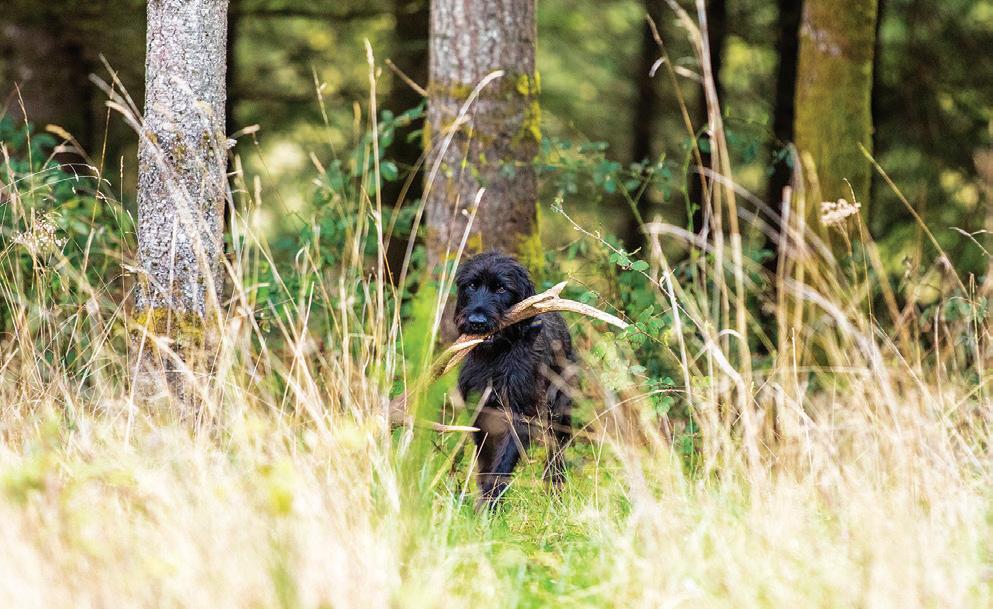
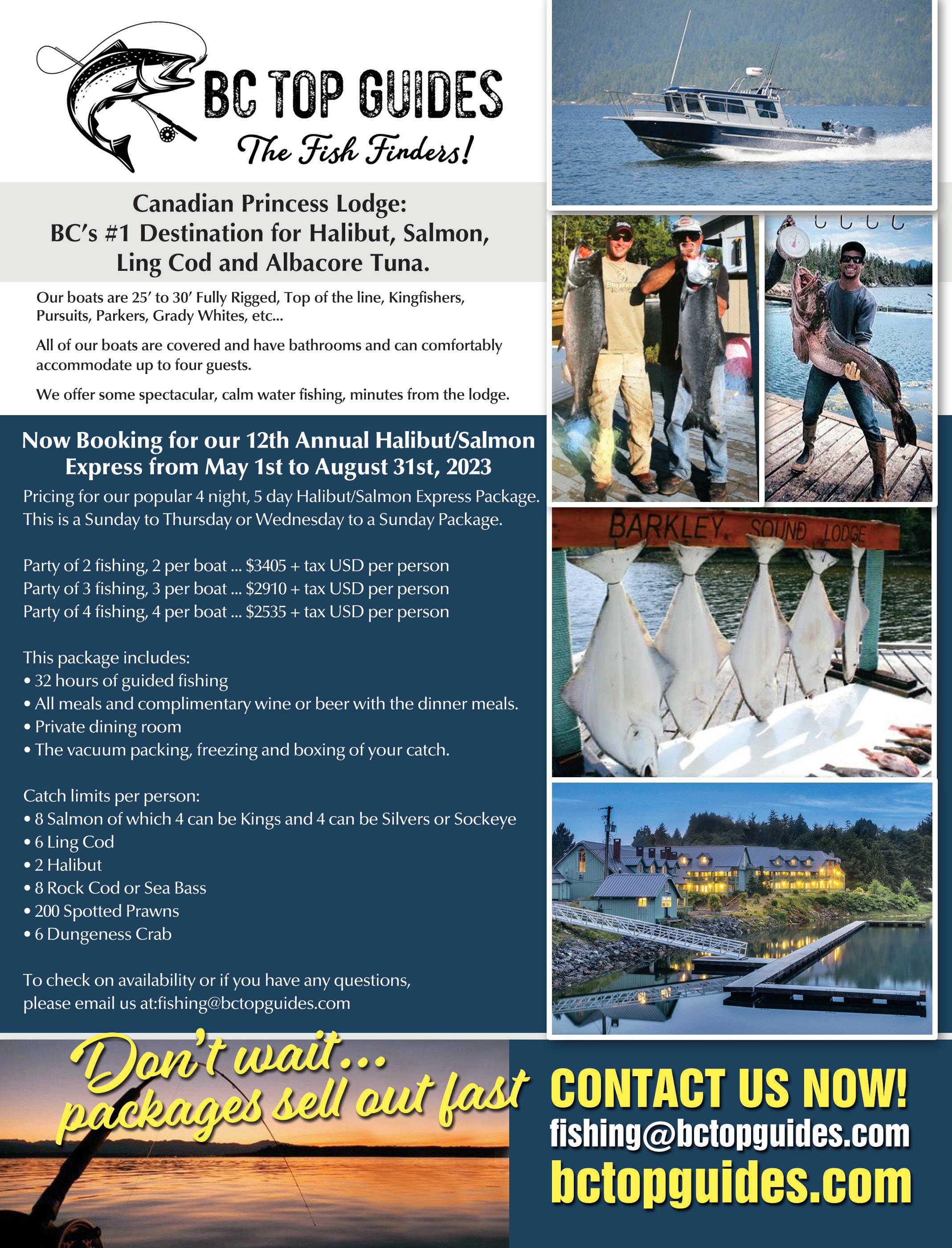







Your LOCAL Hunting & Fishing Resource
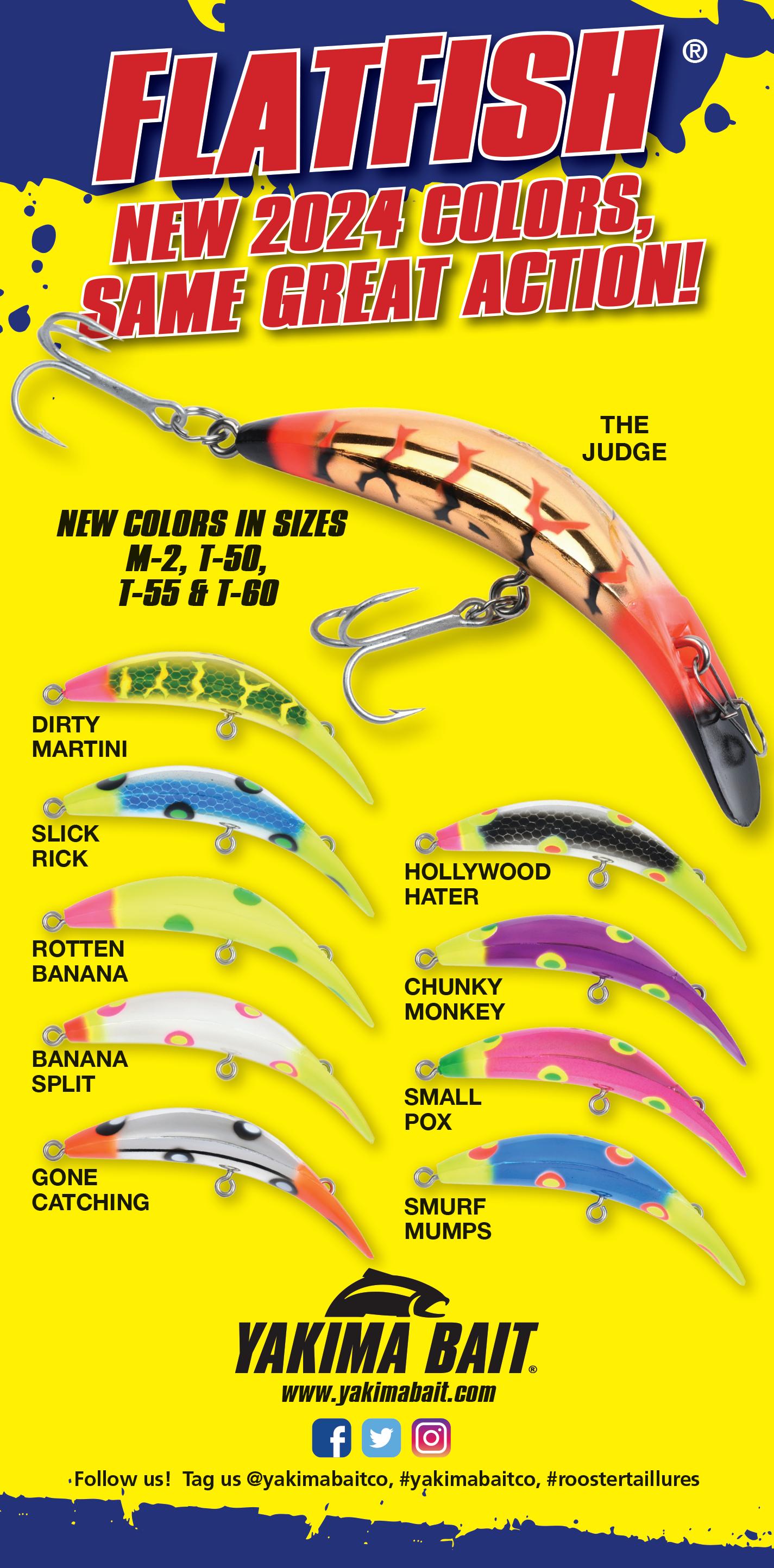
Volume 15 • Issue 7
PUBLISHER
James R. Baker
GENERAL MANAGER
John Rusnak
EXECUTIVE EDITOR
Andy Walgamott
EDITOR
Chris Cocoles
CONTRIBUTORS
Mark Fong, Scott Haugen, Tiffany Haugen, Tim E. Hovey, Todd Kline, Joe Sarmiento
SALES MANAGER
Paul Yarnold
ACCOUNT EXECUTIVES
Mike Smith, Zachary Wheeler
DESIGNER
Lesley-Anne Slisko-Cooper
PRODUCTION ASSISTANT
Kelly Baker
DIGITAL STRATEGIST
Jon Hines
ADMINISTRATIVE ASSISTANT
Katie Aumann
INFORMATION SERVICES MANAGER
Lois Sanborn
ADVERTISING INQUIRIES ads@calsportsmanmag.com

CORRESPONDENCE
Email ccocoles@media-inc.com
Twitter @CalSportsMan

Facebook.com/californiasportsmanmagazine

ON THE COVER
Todd Kline (right) and his mom have enjoyed a lot of fishing excursions over the years.
“Every time she visits me in California, we make sure to set up at least one day for fishing,” Kline says. (TODD KLINE)
MEDIA INC PUBLISHING GROUP 941 Powell Ave SW, Suite 120 Renton, WA 98057 (800) 332-1736 • Fax (206) 382-9437
media@media-inc.com
www.mediaindexpublishing.com
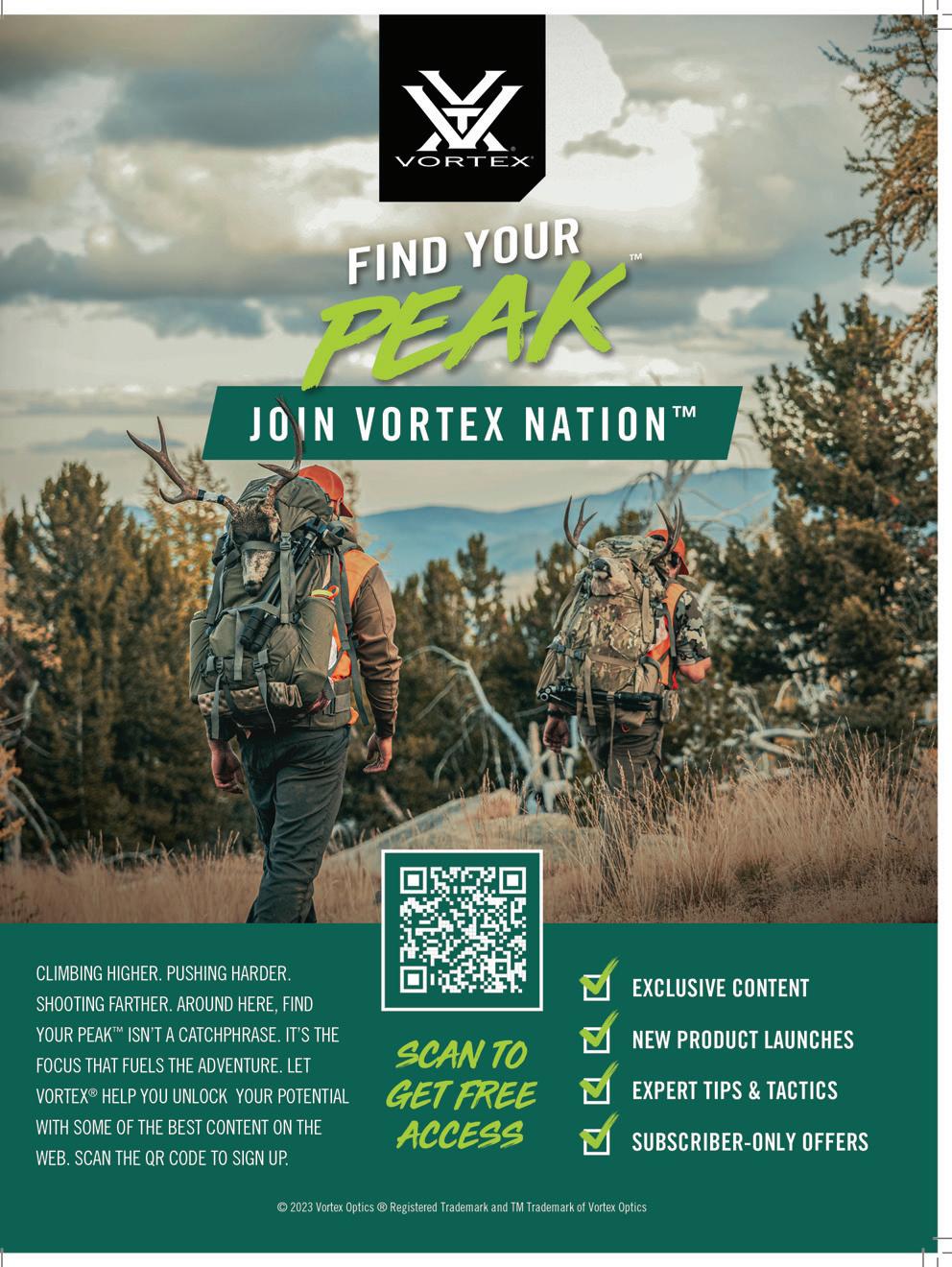
Remember all the moms this month! Stories of fathers and sons sharing the joy of fishing together are ubiquitous, but what about angling with Mom? Todd Kline grew up in Florida, where his mother still resides. But when she visits her son and grandkids in Southern California, the duo always finds some time to head out on the water, where bass fishing guide Todd puts Mama Kline onto some outstanding largies. To celebrate Mother’s Day, we asked Todd about family bonds and fishing.
Pacific Northwest native Steve Raymond has written about a dozen books on his love of fly fishing. His latest credit, Six Fish Limit, is a collection of short stories (plus a novella) that allowed Raymond to add some fiction to his CV chronicling a sport he’s loved for most of his 83 years. Along with an excerpt from the new book, we asked Raymond a few questions about his fishing memories in California, his love of writing and the precarious situation West Coast salmon and steelhead are enduring.
California’s spring turkey season ended in late April, but the hunt continues south of the border. Scott Haugen shares how he and two friends headed to Mexico last May in search of a wild turkey “world slam,” harvesting all six subspecies of the giant upland birds. Find out if Scott and his pals hit it big in Sonora on Gould’s, and stick around for Tiffany Haugen’s latest From Field to Fire recipe, this time a fish sticks meal made for the whole family.
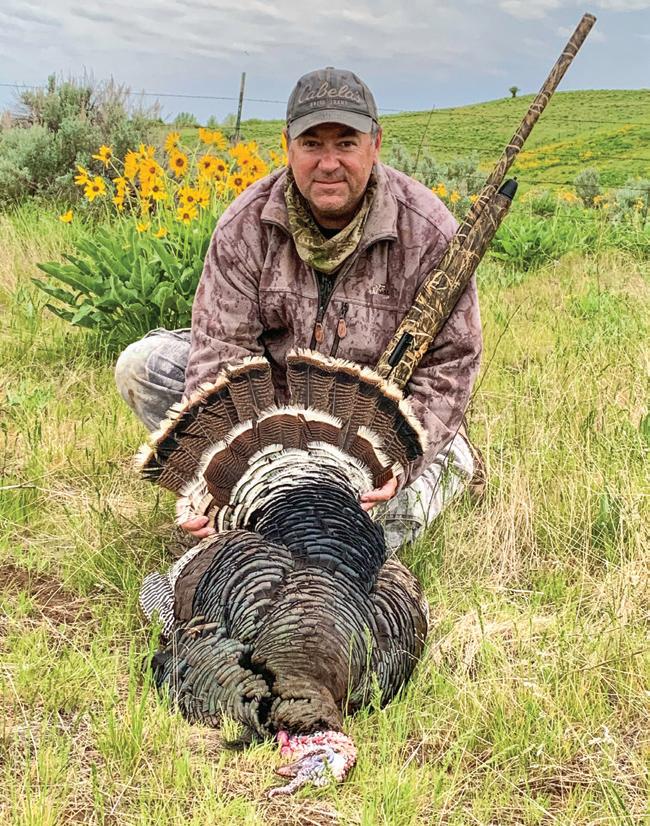


I’m getting too old to remember everything that’s happened in my career in journalism, but I’ll never forget one of the first feature stories I wrote in my first job out of Fresno State.
I was the sports editor of the Madera Tribune, a small, six-day-aweek newspaper north of Fresno. With no high school or college sports, summer was slow, but I was told about a 93-year-old man in town who just happened to be a master-level diver. So I met him and his daughter at the Madera High School pool, where the guy looked like Greg Louganis doing 2½’s and pikes off the 10-meter diving board. I was amazed, impressed and humbled by his skills.
When I found out he passed away a few years later, it was the first time someone I wrote about had died. It was inevitable, but it was still surreal. I guess it’s a case of some of those professional interactions stick more than others.
Now, about 10 years into my tenure as California Sportsman editor, I’ve had to endure two sudden and unexpected deaths of contacts who I’d worked with more than once. I’ve written in this space about the passing of Marysville guide Manny Saldana, who I fished with multiple times. I still miss and think of him often.
And early in April I awoke to a Facebook post from the bereaved daughter of Randy Houston. Randy had ties to the Bay Area’s San Mateo County, and his brother Jerry was a highly decorated Army sergeant with tours of Vietnam. While Randy didn’t serve in the military, he spent much of the later years of his life running Purple Heart Anglers, a California-founded nonprofit that arranged fishing and hunting excursions for disabled and wounded veterans from seemingly every American conflict since World War II.
Like Manny’s death, Randy’s passing was so swift I still haven’t quite processed it. I know when I retire I want to do something to help like Randy did (I’m thinking I want to work with dogs). But I don’t feel like I’ve been selfless enough after getting to know Randy. And I hurt for his family members; I hurt for all of those veterans he cared enough about to try and help.
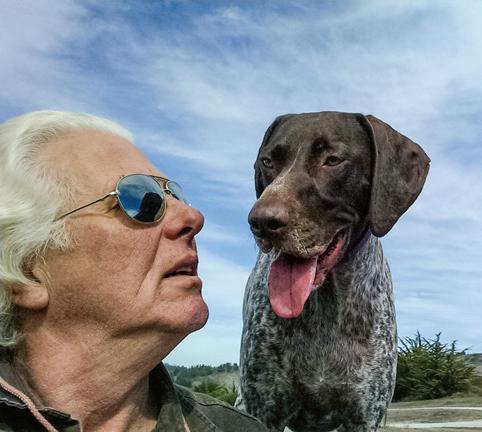
The last story Randy and I worked on was to recap his 2021 Alaska trip. He shared how much watching the joy of his late brother’s fellow soldiers and sailors fish for salmon and halibut meant to him
“To see them, it gives me personally a sense of satisfaction, saying thank you for what they’ve done and also what they’ve done for me and my family,” he said. “All of the stuff that they went through to be of service to me. And to be able to stand there and catch fish was something I won’t forget … I’m proud of the people who are involved with (Purple Heart Anglers).”
I’m grateful I had a chance to write some of their stories. Thank you, Randy. RIP. -Chris Cocoles
The #MK02 Trolling Motor Mount accommodates some Minn-Kota, Garmin, and Lowrance bow mount trolling motor’s installation in any of the LeeLock Quick Change Bases. Simply slide your Motor Mount on the base and lock it in with the pin. The #MK-02 Motor Mount will fit in the LeeLock #QB-01 Quick Change Base, the #QBR-01 Quick Change Bow Roller Base or either of the bases that are sold with the Large Anchor Can Assemblies (#LCA-02 and #LCA-03

This new tool from Leelock will allow you to measure your Dungeness crabs to determine which ones are legal to keep. Then use the Crab Cracker to crack them in half, separating the two clusters from the shell and guts.


The Crab Cracker has been designed so that it sits nicely on top of a 5-gallon bucket, perfect for when you clean crabs. The bucket gives you a stable base, which makes it easier to clean – the guts and shell go into the bucket, making cleanup a snap. Crabs cleaned this way take up half as much space as whole crabs, so you can cook twice as many in your kettle.
The Crab Cracker is a unique tool made from solid aluminum, and comes in handy for cleaning Dungeness crabs.









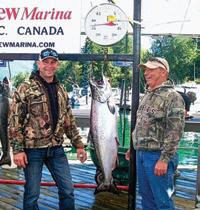
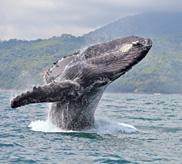

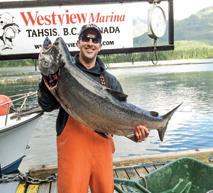

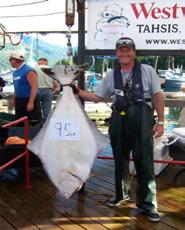


We’re not ashamed to admit it: Todd Kline has the kind of life we wish we could experience. Kline’s a former professional surfer, a successful co-angler on the FLW Tour and a Southern California bass guide, plus he gets to travel the world as a commentator for the World Surf League’s telecasts. Todd has agreed to give us a peek on what he’s up to each month. For more on Todd or to book a guided fishing trip with him, check out toddklinefishing.com, and you can follow him on Instagram at @ toddokrine. –The Editor
With Mother’s Day arriving May 14, we sat down with Todd Kline to ask him about some of his experiences fishing with his mom Sue Kline (check out the photos here and on our cover this month) and how those memories inspire his relationship with his son Dylan.

California Sportsman What are your earliest memories of fishing with your





We fished a few times together as a family when I was young growing up in Florida. My parents divorced when I was 8 years old and it was not until my adulthood that my mom and I really started to fish. Every time she visits me in California, we make sure to set up at least one day for fishing.
Did your mom introduce you to

My father introduced me to fishing and then I took it upon myself to fish almost daily as a kid in Florida, as we lived on the water.
CS Is it hard to not be closer to your mom now that you’re living in Southern California?
TK Moving to California at 21 was awesome on so many levels for me as an individual, but it is very hard being away from all my family, which still lives in Florida .
CS Tell me about the time last fall when your mom visited and you went bass fishing, as seen in some of the photos on these pages.
TK We fished on San Vicente in San Diego. The fish were chasing baitfish and we crushed them throwing Flukes. It is so fun for me watching Mom fight big largemouth bass. She loves it, and the fact that she does makes it even more fun.
CS Now that you’re a dad, do you see a lot of similarities in getting your son
“I imagine that it’s got to be even cooler for Mom fishing with me,” Kline says of their experiences on the water. “She loves it and the fact that she does makes it even more fun.” (TODD KLINE)
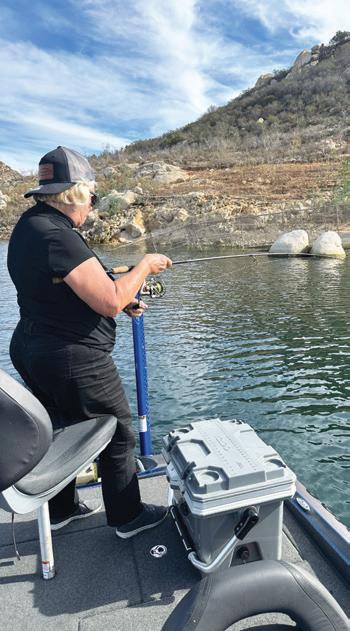


“It’s these times I am blessed to share with my mom that I will always cherish. Life is short! Enjoy it with those you love,” Kline says. “Happy Mothers Day to all the moms out there!” (TODD KLINE)
involved in fishing and other activities he’s been doing like lacrosse and surfing like you remember with your mom?
TK Yes; I imagine that it’s got to be even cooler for Mom fishing with me. I love the time I have with my son. No matter the activity, time with your family is what it’s all about. Those memories we create with family go to the grave. Nobody can take that from us and it truly is special.
CS Is there anything else you want to share about your mom or being a parent sharing fishing with your own kids?
TK I recommend that if you have kids, introduce them to the outdoors and fishing, as it will create great memories and also it’s very healthy in many ways. Unplugging from the hustle and bustle clears the mind and allows me to connect with nature. It’s these times I am blessed to share with my mom that I will always cherish. Life is short! Enjoy it with those you love. Happy Mothers Day to all the moms out there!
Sue hooks up with a SoCal bass. (TODD KLINE)


MAY
1-14 Additional junior wild turkey season
1-14 Archery-only spring wild turkey season
6 NorCal Trout Angler’s Challenge, Pardee Lake; anglerspress.com/events/ norcal-trout-anglers-challenge
6-7 Shasta Lake Team Kokanee Derby; kokaneepower.org
6-JUNE 12 Round-Up at the Lake Spring Fishing Derby, Convict Lake; (800) 992-2260
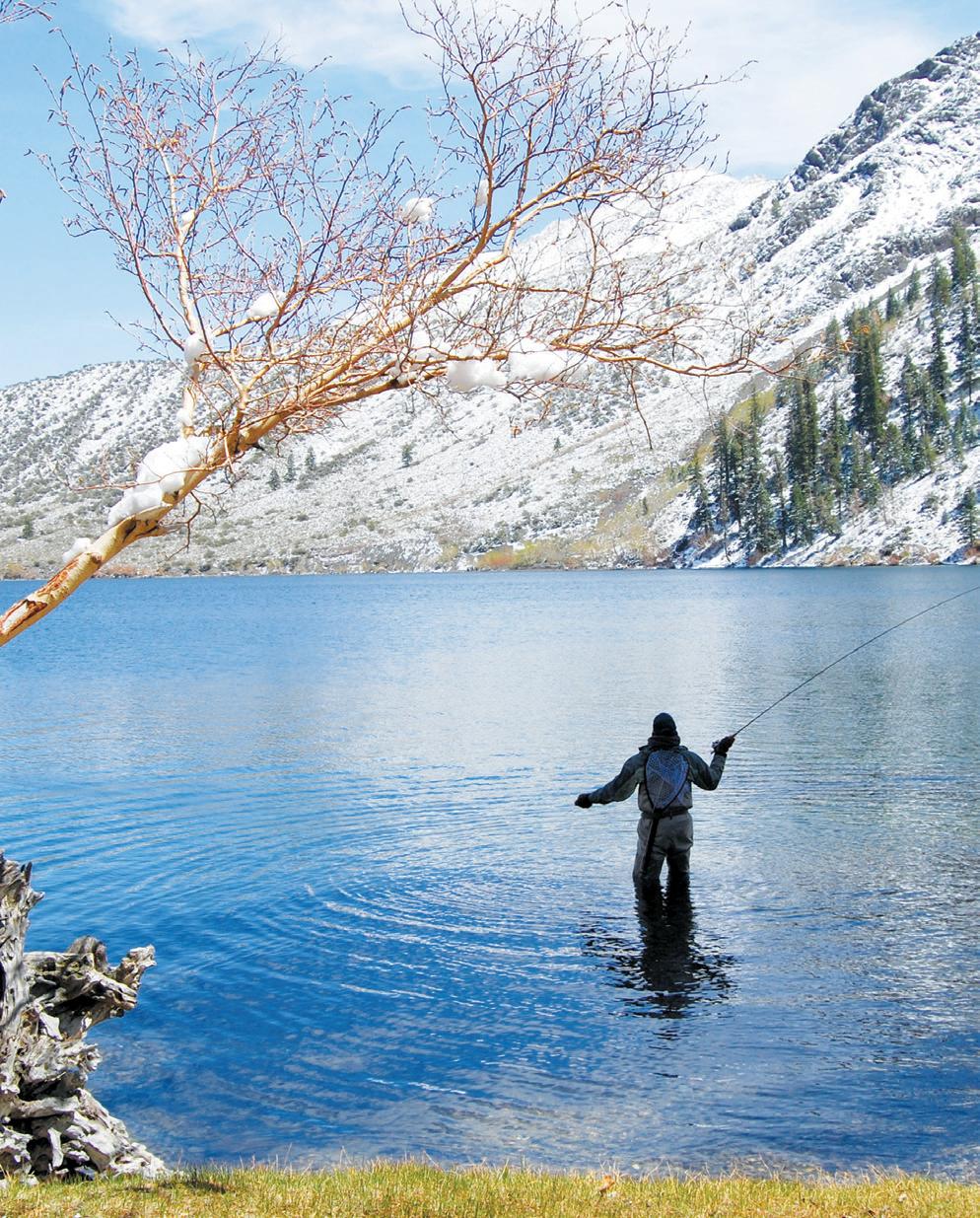
20 Lassen Spor tsman’s Club Junior Kids’ Fishing Derby, Susan River Memorial Park, Susanville; facebook.com/ LassenSportsmensclub
20 Pardee Lake Kids Kokanee Derby; kokaneepower.org
20-JUNE 4 Isabella Lake Fishing Derby; kern rivervalley.com/isabellalakefishingderby
26 Star t of Crowley Lake Perch Derby; crowleylakefishcamp.com, (760) 935-4301
26-29 Hangman’s Cash Bonus Weekend, Convict Lake; (760) 935-4301
JUNE
3 New Melones Reservoir Team Kokanee Derby; kokaneepower.org
3 North Fork Boosters Club Children’s Fishing Derby, Willow Creek, North Fork; northforkboosters.org
9-10 Finest Annual Trout Invitational Tournament, Crowley Lake; crowleylakefishcamp.com
10 Greg Marks Youth Fishing Derby, Shaver Lake; shaverlaketrophytroutproject.org/ youth-fishing-derby
10 Rush Creek Clean-up and BBQ, Silver Lake Resort; silverlakeresort.net; (760) 648-7525
10-11 Youth Angler’s League Northern Region, Sacramento-San Joaquin Delta; anglerspress.com/events/ youth-angler-s-league
24 Bridgeport Fish Enhancement Foundation Trout Tournament; bridgeportfish.com/tournament
JULY
1 Free fishing day; no general license required in state waters; wildlife.ca.gov/ Licensing/Fishing/Free-Fishing-Days
For a list of upcoming bass tournaments, go to nrm.dfg.ca.gov/FishingContests/default.aspx.
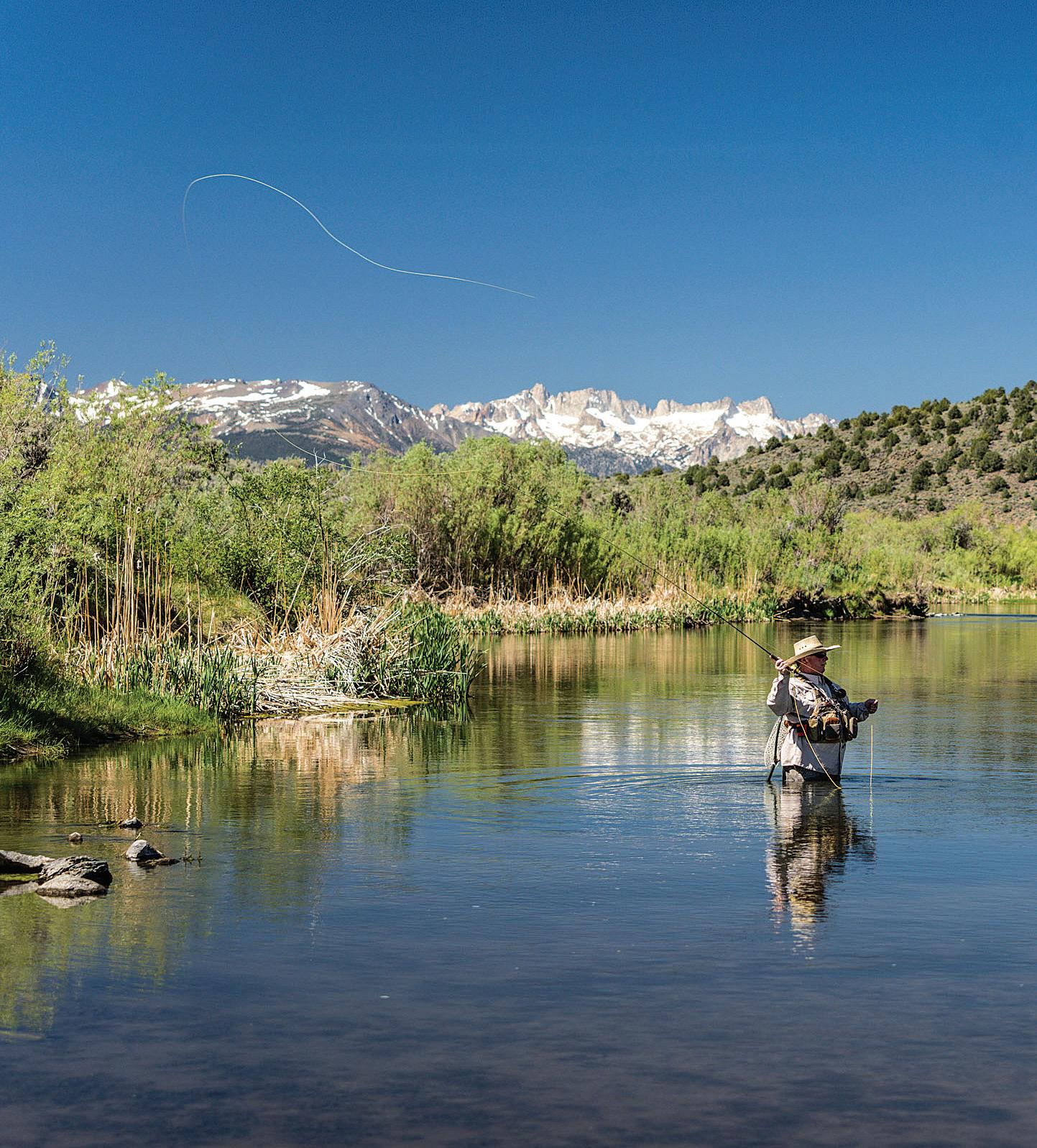
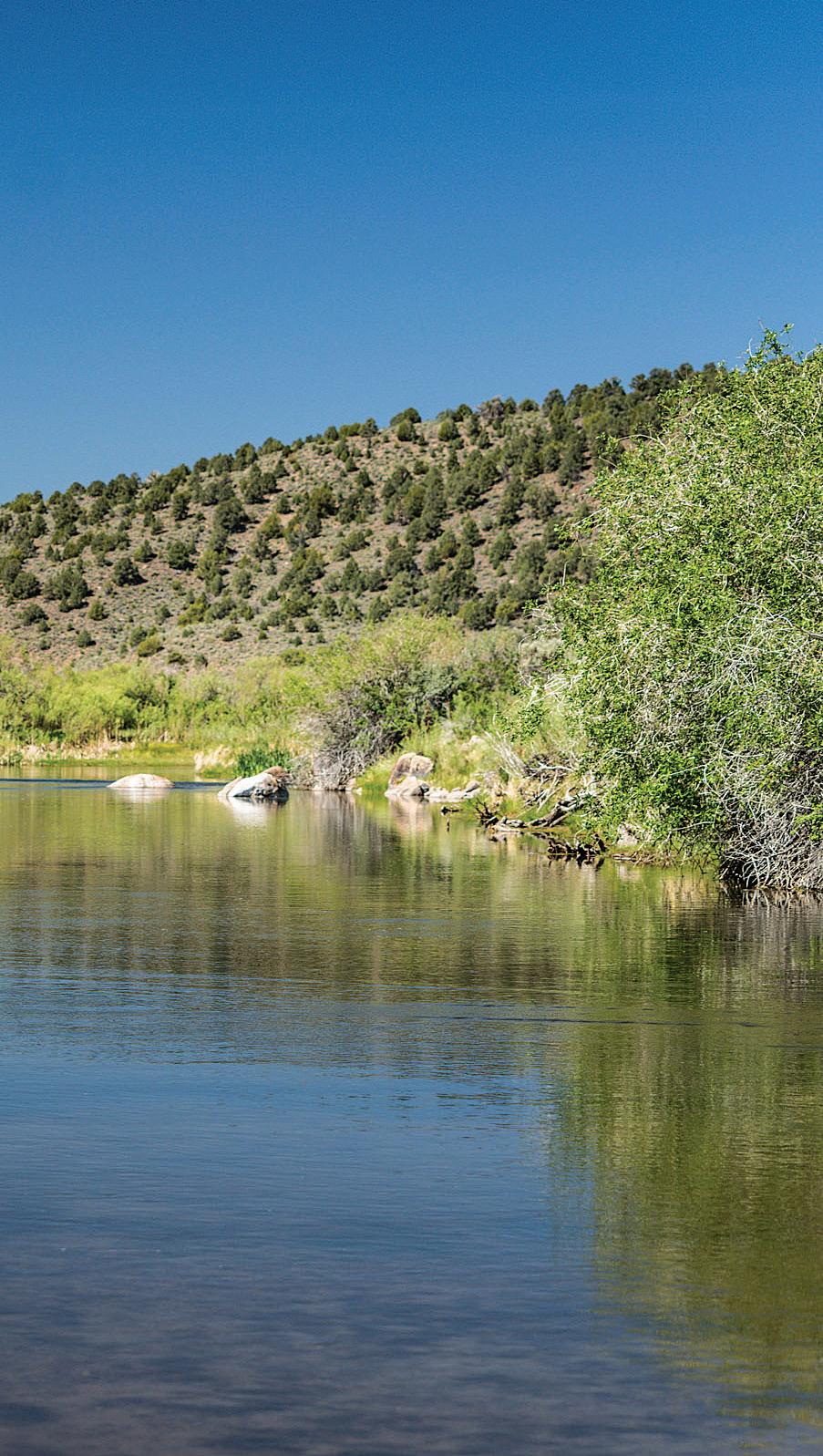 By Chris Cocoles
By Chris Cocoles
In his latest book, Six Fish Limit, Steve Raymond pivots away from his nonfiction portfolio for a series of short stories – plus one novella –that bring to life the joy, passion and beauty of fishing, with a juicy scandal about plagiarism thrown in the mix.
“Fly-fishing literature is a genre rife with tired cliches and posturing, but Steve has a knack for reinventing the wheel in fresh and interesting ways,” says fellow author John Gierach, whose book Dumb Luck and the Kindness of Strangers was featured in CS in April 2020. “It’s always a pleasure to read Steve Raymond.”
Now 83, Raymond, a Pacific Northwest native and a former newspaper editor in Seattle, has written more than a dozen fishing books, and Six Fish Limit features tales such as “Welcome to the Stub Mountain Fly Shop,” about a mom and pop fishing store owner desperate to keep her father’s business afloat after inheriting it. And in “Diary of an Unknown Angler” Raymond creates fishing detective Andrew Royster, a college professor and avid fly angler who reads an old diary entry that “appears to hold the solution to one of fly fishing’s greatest mysteries.”
This book (see sidebar for an excerpt) offers another chance for Raymond to profess a lifelong affection.
“Life is short; go fishing whenever you can!” Raymond said in an email interview. He talked to us about some memorable California adventures, his admiration for steelhead fishing and how critical it is to preserve anadromous fish runs up and down the West Coast.
Chris Cocoles What was the inspiration for the short stories/novella you tell in Six Fish Limit?
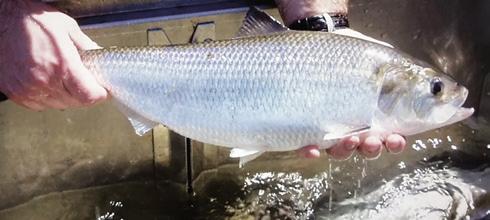
Steve Raymond The “inspiration” – if that’s what it was – is that I really needed to do something to keep from going stir-crazy while my wife and I hunkered down during the early days of the Covid pandemic, and writing another book seemed the perfect remedy. It not only kept me entertained, but I hoped it also would entertain others in the days ahead. It also gave me an opportunity to write some stories I’d been carrying in my head for a long time.
CC There are so many great fish tales and anecdotes in this book. As a longtime newspaper sports reporter and now a magazine editor, I love the idea of storytelling through writing profiles and feature stories. Is that something you’ve always loved as you’ve evolved as an author and also
a newspaperman yourself during your career at The Seattle Times?
SR As a reporter I was pretty much a hard-news guy, and in those days The Seattle Times had six daily deadlines, which kept everybody busy. But tackling hard news didn’t allow much flexibility in writing, so I started freelance writing about fly fishing (my passion) and that soon led to writing books. That gave me the freedom to describe some of the people and places I’ve encountered in my fishing experiences, usually with the goal of trying to alert readers to the wonders of the natural world that make up so much of the fishing experience; I call it the “awe” of fishing.
CC I think my favorite story in the book was “The Man In the Black Waders” about Clint Steele, “the most famous fly fisher in the world,” who was accused by a retired teacher of plagiarism. Is there a backstory to
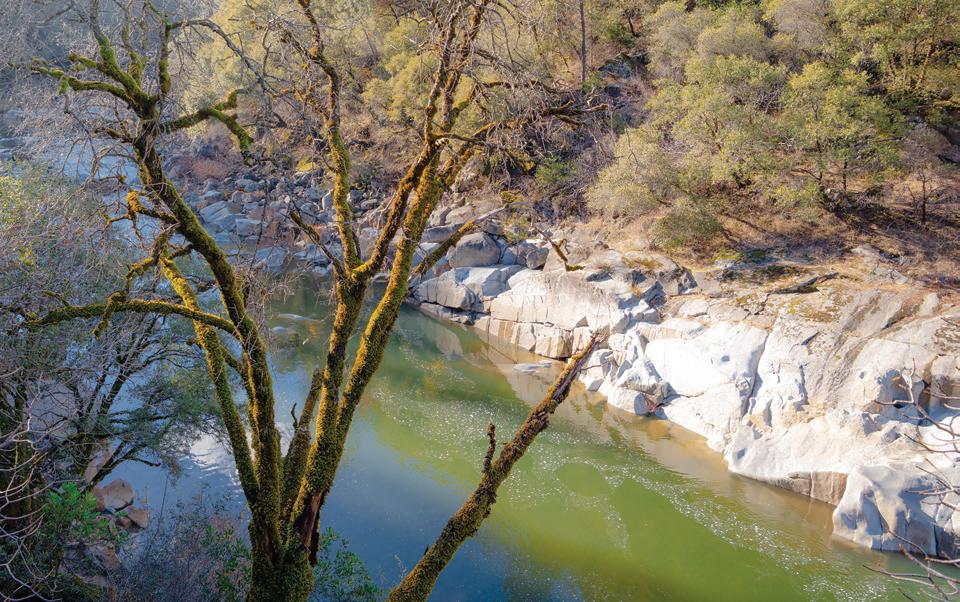
your idea for writing that novella?
SR Actually, there is. As editor of two fishing magazines I learned the hard way that plagiarism can be a problem in that business. It usually happens when an unethical person copies part or all of someone else’s work and submits it to a magazine under his or her own name. Since it’s impossible for editors to read everything about fishing, some of those stories inevitably get published, and then a reader, or perhaps the original author, will discover the story was plagiarized and complains to the magazine. This almost always leads to a difficult, messy situation that leaves everyone unhappy, and the person who perpetrated the plagiarism ends up blacklisted by the magazine that published the purloined material. Fortunately, there isn’t too much of this, but The Man in Black Waders gave me a chance to let readers know that it does happen, and usually has very bad consequences for the guilty party.

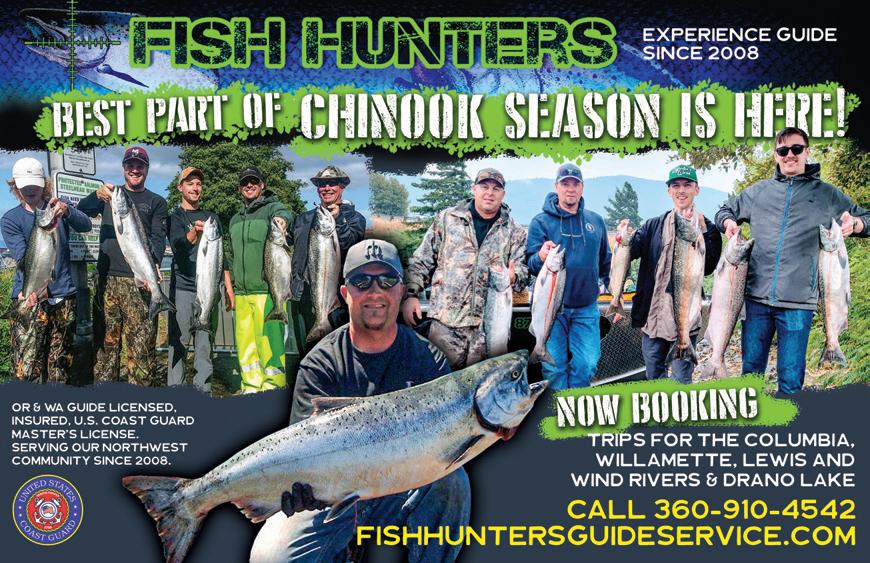
Editor’s note: The following is excerpted from Steve Raymond’s latest book, Six Fish Limit, published by Skyhorse Publishing and available for purchase at amazon.com/Six-FishLimit-Stories-Fishing/dp/1510770011.
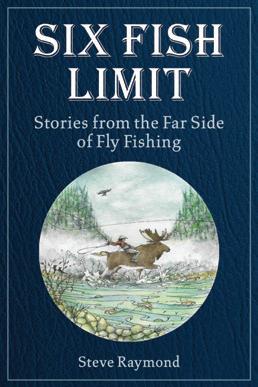
Itried to resume my fly-fishing education by looking at other websites.
What I found wasn’t very helpful; there were so many sites and they were so variable in content that I soon gave up. The only thing I learned was that fly fishing was a sport heavily laden with celebrities, of whom Clint Steele was the foremost. But I had known that already.
I decided my time might be spent more profitably at the public library, so that’s where I went next. And that’s where I learned that fly fishing has even more books – many more – than it has celebrities. There were also lots of videos, including “Fly Casting with Clint.” I checked it out along with several promising books, including Steele’s Eight Great Western Steelhead Rivers and another titled Permit Me, which I subsequently learned was about fishing for a saltwater species called permit, which I’d never heard of. The library didn’t have a copy of Mickey Cutter’s book, so I returned to my office and ordered a copy from the Internet. Everything else I took back to my dingy, cramped, hugely overpriced apartment to study.
And that’s pretty much all I did for the next few days. Somewhat to my surprise, I learned that fly fishing is a complex sport combining elements of philosophy, nature study, literature, biology, limnology, and probably a few other ologies I hadn’t encountered. It even had touches of religion.
Oddly enough, it was Steele’s casting video that was most helpful. I didn’t like his high, nasal voice, but his presentation was clear and well-organized. From it I learned that the fly rod acts as a lever to propel the weight of a thick, tapered fly line, which has on its end a translucent leader with a virtually weightless fly attached, and in this it is different from all other forms of fishing
where casts are made with the weight of the lure pulling an almost weightless line behind it. That made everything clear and helped me understand why there were so many different lengths of fly rod and weights of fly line.
The video was much clearer and easier to absorb than Steele’s prose. I figured someone else had written the video script and Steele had read it off a teleprompter.
When Cutter’s book arrived I opened it and started reading the foreword:
Let me tell you about a river. Its name is the Biscuit – an odd name for a river, but that’s not the river’s fault. It was the name given by the country’s original inhabitants in a language no longer spoken or understood. The earliest European settlers translated it phonetically into a word most often spelled “Boisquoit,” or something similar. Inevitably, the word was eventually corrupted into an Anglo term more familiar to the settlers, and the name became Biscuit. The exact meaning of the word has been lost to history, but there’s an enduring legend that in the long-dead language of the local tribes it meant “thunderwater.” That seems unlikely to me, because the Biscuit
is, at most, a medium-sized river, and while it may sometimes run fast and noisy, never have I heard its sounds rise to the level of thunder. More likely this was the brainstorm of some real-estate developer.
The Biscuit is a rain-fed river, rising in coastal mountains where rain is abundant and frequent. Its headwaters are a series of small creeks that flow from the high country in shadowed canyons, creeks with names like Blaze, Spar, Harvey’s, Bitter, Spruce, and Fog, and finally join one another to form a juvenile river that soon grows larger with the addition of other tributaries as it makes its way first south, then abruptly turns west to begin a 60mile flow to the sea.
Those little headwater creeks have been treated badly. A couple of generations of loggers cut them down to their edges and left them full of trash and silt washed down from the naked slopes. Miraculously, over time, most of those little streams managed to recover, and their recovery brought health back to the river itself. Of course it is not the same river the Indians knew, no longer as swift or cold or clear, and its runs of salmon and steelhead are no longer as great as they once were. But they are still good, especially the steelhead runs, and the Biscuit, although little known, provides steelhead fly fishing of a sort not found on most contemporary rivers, even those of much larger size.
There are two runs of steelhead in the Biscuit. The summer steelhead come first, usually about the time June becomes July. They trickle in steadily until late September, and although there never seem to be a great many of them, they spread quickly throughout the river and if you know where and how to look you can usually find them somewhere. The winter run is much larger and usually bursts into the river during the first big freshet of December. This vanguard is followed by a steady stream of latecomers, and they all join together and rest in the lower pools until mid-February, when the business of spawning begins. So during those seasons – July through September and December into February – the Biscuit offers fly-fishing opportunities worthy of pursuing.
I know this because for much of my life
I have had the good fortune to live in a cottage next to the river, and whenever it was in fishing shape – and I was in similar shape – there were few days when I didn’t spend at least a little time casting a fly into its tempting waters. Many other days I started fishing in the early dawn and continued until I could start counting stars in the evening sky. When you spend that much time on a river, you get to know it very well, to understand the idiosyncrasies of each pool and pocket, the ways and habits of the steelhead, the flies and tactics that seem to work best.
The fishing was never fast. Steelhead fly fishing never is. But if you have patience, persistence and the willingness to put up with some occasional mild discomfort, the results will nearly always prove well worth the effort. One of the most thrilling sights in angling is that of a summer steelhead rising spectacularly to a riffle-hitched fly on the surface, and the sudden hard take of an unseen winter fish is scarcely less
CC Do you have a favorite of all the fishing books you’ve penned?
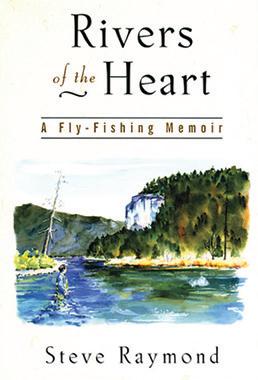
SR Actually, I have three favorites: The Year of the Angler, The Year of the Trout and Rivers of the Heart
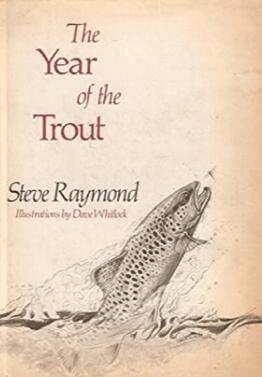
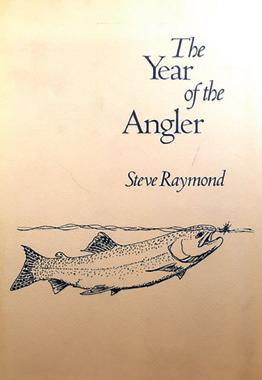
CC Where did you first find your passion for fly fishing?
exciting. If you think about it, there really aren’t very many people who have experienced such moments. You’re lucky if you are among the few who have.
If you haven’t yet, maybe this little book will help you get there. In these pages I propose to tell you much of what I have learned about the river and its fish. I confess I approach this task with some trepidation, because some of these secrets were very hard-earned and I have a natural reluctance to share them. However, I was a teacher by profession (I’m retired now) and have always believed that anyone with knowledge is obligated to share it, else we fail to keep the human experiment moving forward. That’s my motivation, just so you understand it.
But while I’m willing to share with you some of what I’ve learned, I’m also bound by conscience to ask your pledge to use the knowledge wisely, keeping the health of the river and its steelhead always in
SR My earliest memory of my father was when I was 5 years old and he came home from serving in World War II. He was a fly fisherman and one of the first things he wanted to do when he got home was go fishing, and he took me along. After that I couldn’t think of anything I’d rather
mind. By that I mean it’s all right if you keep a fish now and then – remembering always that each one you keep may subtract many others from future runs – so long as you do it in strict moderation and with valid purpose. I mean also that you should become a champion of the fish and the river and be willing to fight for both, keeping the Biscuit and its tributaries free from again being logged down to their banks, or dammed, or filled with silt and trash, or becoming the victims of all the other mean and selfish things people to do rivers and their inhabitants.
Do I have your word that you will do this? OK, then. Let’s get started. -Mickey Cutter
After reading that I found myself liking Mickey Cutter. It was obvious he wasn’t a very experienced writer, but he had a natural flair for the language and a friendly manner that drew me in. SR
do than go fishing with a fly.
CC Do you have fishing memories in California?
SR My fishing time in California has been pretty limited, but my wife’s parents used to live in Marin County and sometimes when we visited
I’d get a chance to go fishing. My father-in-law introduced me to a friend who was a fly fisher and we went fishing together for shad on the Yuba River. I’d fished for shad before in the Columbia River [in the Pacific Northwest], but that’s big water that required fishing from a boat and casting blind because it was impossible to see the fish (although sometimes you’d hook a steelhead instead of a shad, which wasn’t a bad thing). The Yuba, of course, is much smaller and more intimate and friendly, and when the light was good I could see schools of shad moving upstream, more shad than I’d ever seen before. Unfortunately, my new friend lost his footing and fell in the
river early in the day and had to hike back to his car for dry clothing, so I ended up fishing by myself for quite a while, although there were plenty of other anglers on the stream. Long story short, I had the best day of shad fishing I ever had.
On another occasion, I went to the Yuba by myself at a time when the word was out that the season’s best fishing was already past. I was nearly alone on the river and fished for hours without a touch, then suddenly hooked a single, lonely shad, a big female that put up a real struggle. I was just about to beach it when a pair of other fishermen appeared and expressed amazement at the fish’s size. One asked if I was
planning to keep it, and I said no. Then they told me they had been fishing all day without any luck and they really wanted a big female for its roe and would I, please, just possibly consider giving it to them? I had mixed feelings about that, but I could see they were fly fishermen and they had asked politely, so I finally decided to let them have it. One of them brought out a scale and weighed the fish, which pulled the scale down just past the 6-pound mark. It was the largest shad I ever caught. I hope those guys enjoyed the roe.
CC The general trout season is getting started in California in the Eastern Sierra in late April. How special is it
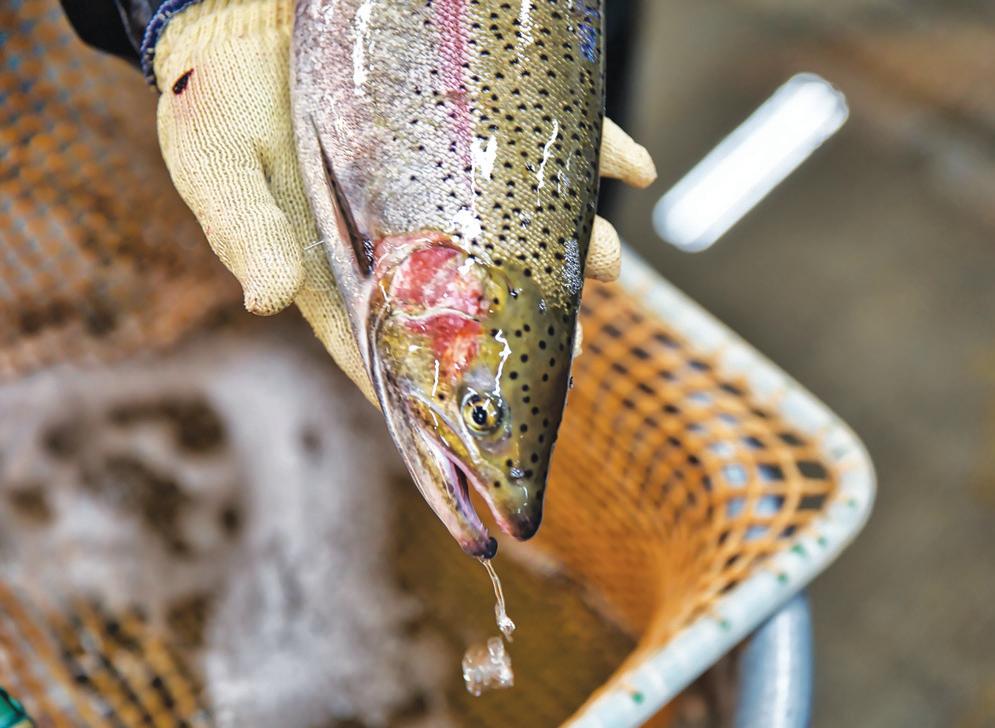










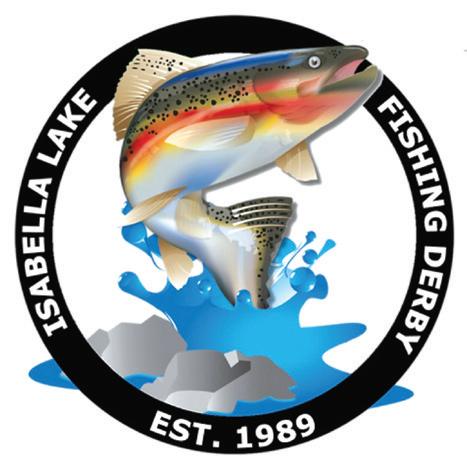









to fly fish for wild and native trout in some of the West’s great rivers and smaller streams/creeks?
SR Regretfully, I’ve never fished in the Sierra, but I think it’s a privilege to fish anywhere in our coastal or mountain streams in the early season, just when the first fly hatches are getting underway.
CC I’m from Northern California and live in Seattle now. And it’s just so depressing to see the struggles that salmon are having up and down the West Coast, including a lot of the king salmon closures in California and Alaska. How frustrating is that from an angler’s perspective?

SR Frustrating isn’t the word for it; it’s maddening. I’ve lived in Washington state most of my life and witnessed not only the decline or extinction of the salmon and steelhead runs, but also most of the trout fishing in the state. Nearly all the places I once enjoyed fishing have since been ruined, either from encroaching “development” or sheer neglect. I’ve seen the same thing in Oregon and British Columbia, where I used to fish
much of the time. The care of fisheries and the waters that sustain them has always been a very low priority for state and provincial governments, with little money or attention devoted to them, and now we see the results. Those resources once were important reasons why people wanted to live in the Northwest; now they don’t exist any longer. My children and grandchildren will never have the chance to enjoy the places I loved while growing up, and neither will anyone else. That’s a tragedy of the first magnitude. It saddens me to think about it.
CC You also have written a lot about steelhead in your book Steelhead Country. What have those fly fishing experiences meant to you over the years?
SR Steelhead always have been an inspiration to me. I think, at a primal level, they exhibit some of the things we humans have always considered attributes of our own species – courage, determination and the will to survive against long odds. So it’s a small wonder that we should admire them
so much, or seek, even subconsciously, to emulate their virtues, especially during a time in our history when wild steelhead are threatened over so much of their native range.
CC After all these years, has there been a bucket list fishing destination that you haven’t been able to cross off your list that you still wish you could? Or still want to?
SR Yes. I’ve always wanted to fish for Atlantic salmon in Iceland, but never had the chance to do that. And since steelhead fishing opened in Kamchatka [Russia], I’ve always wanted to fish that amazing place. Another thing I’d like to do is catch a grayling; I fished one river where a few were present, but never caught one. Now I’m too old to cross any of those off my list.
CC Of all the ones you’ve fished with, do you have an all-time favorite fly? SR I get that question a lot, and I’ve never been able to single out one fly. So I’ll answer it the same way I always do: My favorite fly is whatever one I happen to be using at the time. CS
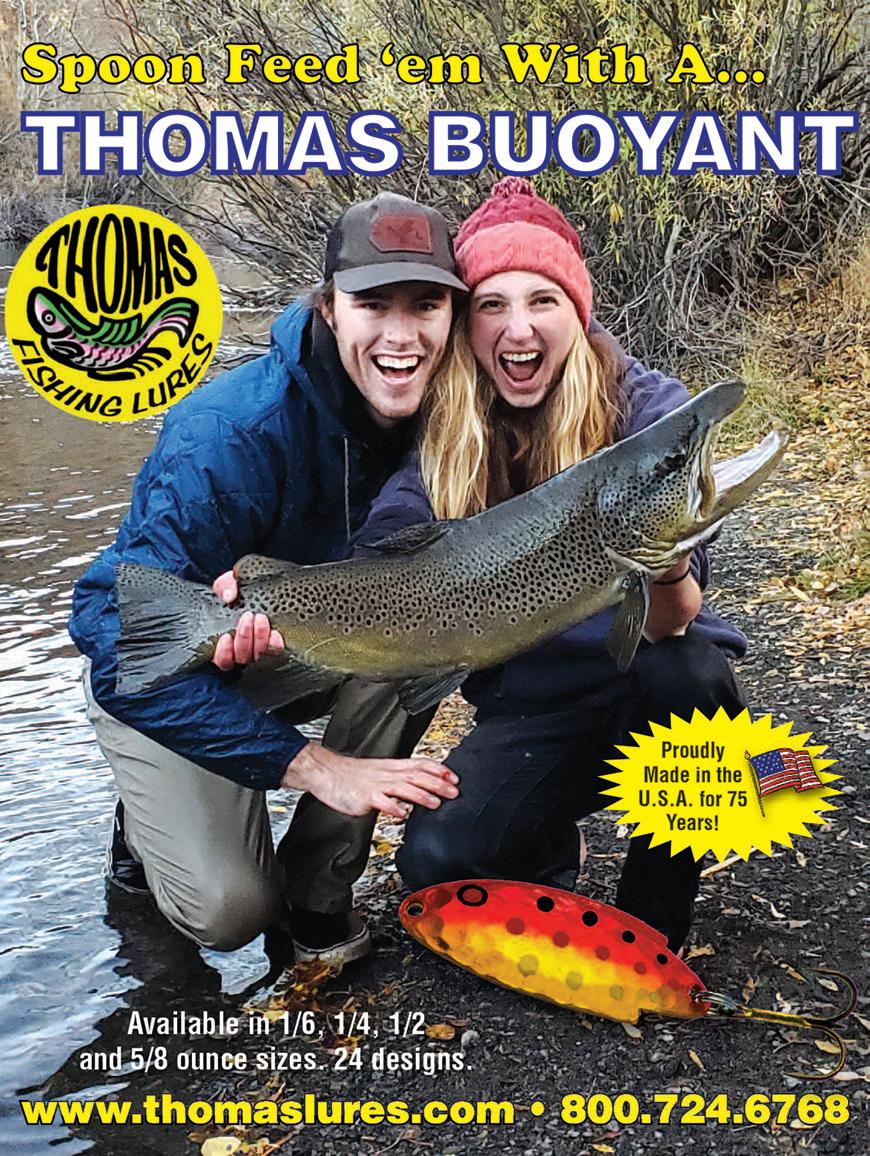
TIME

Docking and maneuvering your boat in high winds has never been so easy. Let the Joy Stick do it for you.




GPS position hold and heading hold is included.
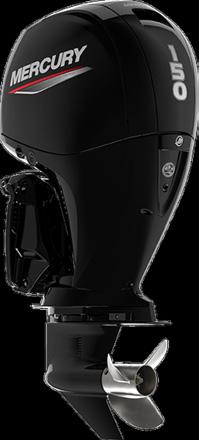
8 and 99 Kicker Motors in stock. Call
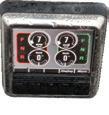
Anyone who has fished with me knows that I am superparticular about my tackle. I have been known to spend hours respooling line, changing out split rings and hooks, rigging and retying baits, and just tinkering with tackle.
Truth be told: I am even more fanatical about my fishing rods. There is just something special about the way a well-designed and constructed
rod feels in your hand and how well it performs on the water. Once I get the opportunity to fish a rod of this caliber, there is no turning back.


A few months ago a friend told me about Prolite Rod Technology, a company located in Tumwater, Washington, a suburb of the capital city of Olympia. Of course, this sparked my curiosity, and after some internet research I made a

call and ended up talking to the owner, Chris Wegeleben. He is a lifelong angler and former Alaskan salmon guide turned rod builder.
Prolite builds a wide variety of technique-specific rods for both saltand freshwater applications, and as it turned out I just happened to be looking to upgrade a few of my older finesse bass spinning rods. I explained to Chris what I was looking for and he helped me select a few models that he thought would best suit my needs.
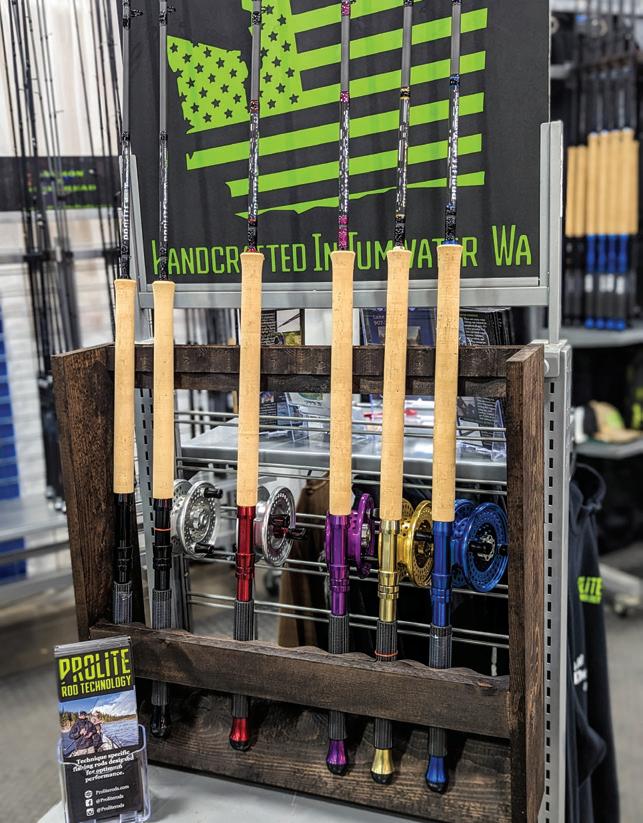
Chris Wegeleben lives and breathes fishing. Not only is he a highly skilled angler, the former Alaskan salmon fishing guide is an active member of the fishing industry. His company, Prolite Rod Technology builds performance-based, technique-specific rods for the fishing-crazed Pacific Northwest and beyond.
Recently, I had a chance to talk with
Chris about his passion for fishing and his quest to build the best rods possible.
Mark Fong How did you get started in fishing?
Chris Wegeleben My grandpa used to take me trout fishing at the local pond. I really started getting serious about fishing in my early teenage years, when my uncle started taking me to Montana and Idaho
to go fly fishing. As soon as I could drive, my buddy Nolan Davis and I got a drift boat and we fished the rivers for salmon and steelhead at every opportunity we got. I then spent five-plus years as a salmon guide in Alaska.
MF What prompted you to start building fishing rods?
CW We [buddies and I] really started building rods out of necessity. Back then, technique-specific rods were not a thing and we had to make do with whatever was available. One of the first rods we built was an ultralight side-drifting rod. We were basically building stuff that we couldn’t get our hands on. It was a lot of experimenting, building prototypes and finding what worked. Soon we figured out we had something pretty cool going.
We continued to build more and learn more and experience more fisheries and continued to expand. Over the course of time, we built a lot of rods for our buddies, then we started building rods for other people who appreciated what we were doing. They started spreading the good word and it just kinda took off from there.
MF Can you tell us about Prolite Rod Technology?
CW Prolite started in 2017. We are a small rod-building company located in Tumwater, Washington. We pride ourselves in producing the best-quality products with the best customer service. We strive to better the fishing industry with a willingness to educate every level of fisherman. We want to teach others about the art and science of fishing.
We built 300 rods last year and are on pace to blow through that number; basically, we have doubled the number of rods we built during the last few years. Each rod is designed and built in Tumwater using the finest globally sourced blanks and components. We build for all fisheries – both fresh- and saltwater, and conventional and fly.





The lightest 200-hp four stroke on the market
The lightest 200-hp four stroke on the market

2.8L displacement and Variable Camshaft Timing give it the best power-to-weight ratio of any 200-hp four stroke
2.8L displacement and Variable Camshaft Timing give it the best power-to-weight ratio of any 200-hp four stroke
Nearly 120 pounds lighter than our four-stroke V6 F200
Nearly 120 pounds lighter than our four-stroke V6 F200
ALL-NEW F200 IN-LINE FOUR.


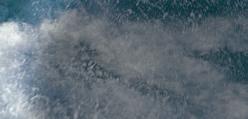
Show the water who’s boss with the new F200 In-Line Four. Incredibly light, responsive and fuel efficient, it serves up plenty of muscle to handily propel a variety of boats. On top of that, its 50-amp alternator offers the power to add a range of electronics, and its 26-inch mounting centers and compatibility with either mechanical or digital controls give you the flexibility to easily upgrade your outboard or rigging. Experience legendary Yamaha reliability and the freedom of forward thinking, with the all-new F200 In-Line Four.
Show the water who’s boss with the new F200 In-Line Four. Incredibly light, responsive and fuel efficient, it serves up plenty of muscle to handily propel a variety of boats. On top of that, its 50-amp alternator offers the power to add a range of electronics, and its 26-inch mounting centers and compatibility with either mechanical or digital controls give you the flexibility to easily upgrade your outboard or rigging. Experience legendary Yamaha reliability and the freedom of forward thinking, with the all-new F200 In-Line Four.
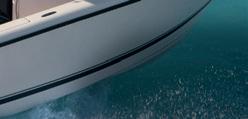
We occupy a unique space in the market. We are a hybrid production and custom rod shop. We have a full line of technique-specific production rods that are available through retail tackle dealers and online from our website (proliterods.com). Unlike traditional production rod companies, we have a custom side of the shop where we are able to do custom work at a cost similar to that of a comparable production rod. We do this by using our base build as a starting point, to which we have added a menu of custom upgrades.
MF Can you speak to the breadth of your overall rod lineup?
CW We build rods for all of our Northwest fisheries, but our bread and butter is salm-
on and steelhead. With that said, we build a lot of trout, kokanee, sturgeon and bass rods as well. We also have a great deal of offshore angling opportunities as well, including: albacore, halibut and bottomfish. On top of that, we build a comprehensive line of technique-specific fly rods.
MF Finally, can you talk about some of your most popular or unique models?
CW Our Northwest-style mooching rods definitely meet those qualifications. The trend toward using a downrigger and a single-action reels has definitely taken hold in (Washington’s) Puget Sound.
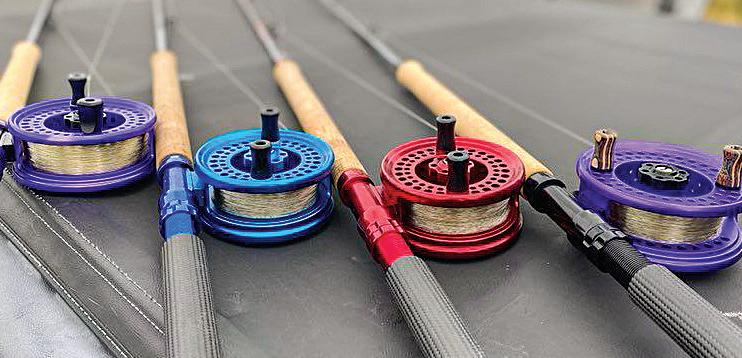
Our 10-foot, 6-inch SVX Float/Bobber Spinning Rod is an excellent all-around salmon and steelhead rod that covers
all the bases. It’s perfectly balanced and just feels good in your hands.
We make a pair of downrigger kokanee trolling rods that are built on lower-modulus graphite blanks and finished with a spiral guide wrap. Unlike traditional fiberglass kokanee rods, graphite is quicker to respond to the movement and head shakes of the kokanee, making them more efficient in keeping the fish hooked up.

The Northwest has some excellent bass fisheries as well, particularly for smallmouth bass. Our 7-foot, 2-inch SVX ML action spinning rod is very popular. It’s a great all-around finesse rod. It fishes everything from Ned rigs to weightless Senkos to drop shots. MF
A collection of Prolite mooching rods. Most anglers’ styles of fishing can be accommodated by Wegeleben’s designs, including those pursuing bass (top) with swimbaits. (MARK FONG; CHRIS WEGELEBEN/PROLITE RODS)

As a small semi-custom shop, Prolite does inventory some of their most popular models, but the bulk of their offerings are built to order, which allows the customer the flexibility to customize their build. Options include custom decals, custom color guide wraps and a selection of build modifications.
Once I placed my order, it took less than two weeks for my rods to arrive. When I unpacked the rod tube, I was stunned by what I saw. My SVX Bass Rods featured satin black graphite blanks paired with silver-framed guides and understated black wraps and silver accent decals. I ordered each rod to be built with split-grip handles. I am really pleased with the look of the graphite reel seat, the silver carbon insert and the silver CNC locking nuts.
This past Northern California winter has been unlike any I can remember,
starting with extreme drought and ending with record snow- and rainfall. All this water is certainly great for the fish, but perhaps not so much for the fisherman – at least in the short run. The constant barrage of precipitation has left the water muddy, cold and put the bass in a less than cooperative mood for this time of the season. But when I saw a small window of opportunity to get out on the water with my new Prolite Rods, I jumped at the opportunity.
The last time I fished Lake Berryessa was in November of last year. At that time, the lake was some 35 feet lower than it is now, a huge difference for Berryessa. When I launched my boat at Markley Cove, the water was right around 50 degrees and had a bit of stain to it. I headed up the lake and by the time I exited the Narrows, the water had turned downright muddy. I spent some time scouting midlake and near the Big Island, but the areas
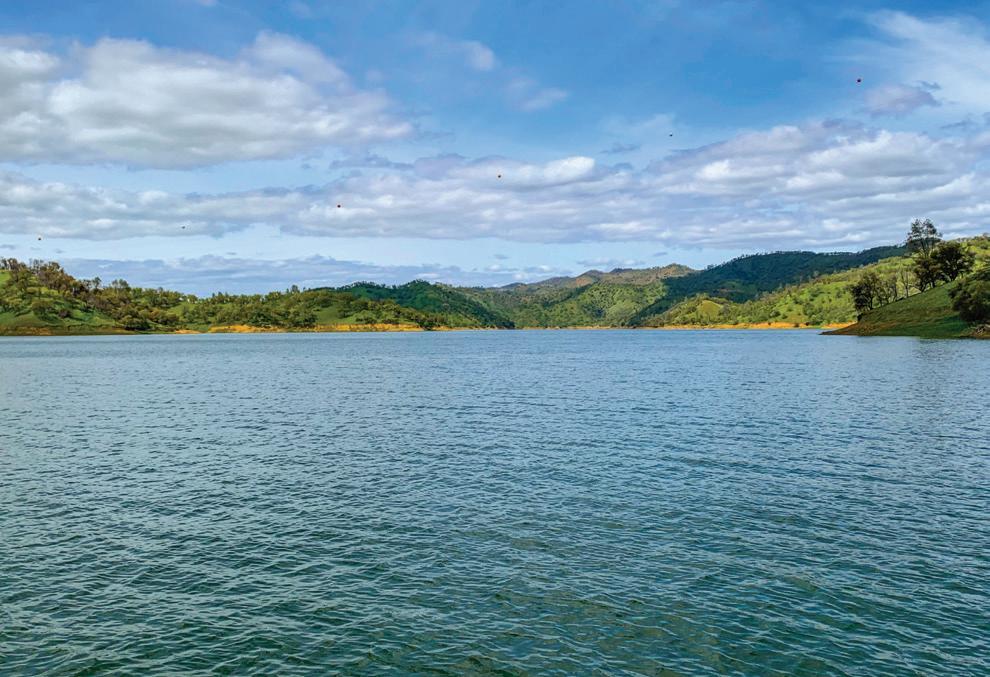
I wanted to fish were blown out, so I elected to run back down toward the dam in search of better water clarity.
I found better conditions at the mouth of Wragg Canyon. By this time, I was anxious to put my new rods from Wegeleben to the test. I spent the bulk of the day fishing points, cuts and small flats on the way back towards Markley Cove, and I had an assortment of different finesse offerings. The fish were definitely scattered. One bite here, one fish there, but I could never find an area that held a good concentration of bass.
I had three Prolite Spinning Rods on the deck of my Ranger: an SVX72 UL-S, SVX72L-S and SVX76ML-S. I paired the 7-foot, 2-inch ultralight with a 2000-series spinning reel that I spooled with a 5-pound FINS braid mainline and a 4-pound Gamma topshot fluorocarbon leader. I rigged

Fong had some good success with a Berryessa bass. “Overall I was very impressed by the light weight and balance of each rod,” he writes. (MARK FONG)
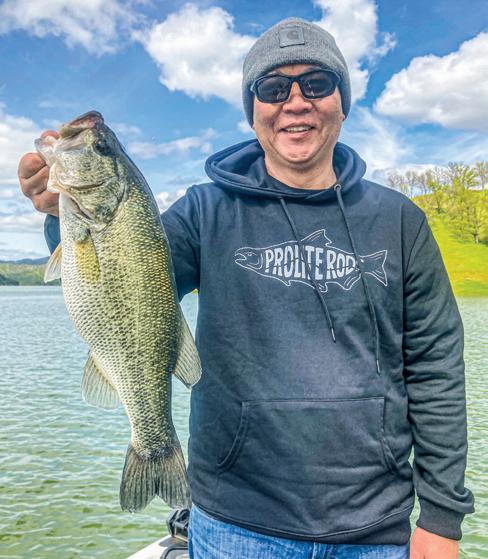
each of the other two rods with a 2500-series spinning reel, 10-pound braid and 6-pound fluorocarbon leaders.
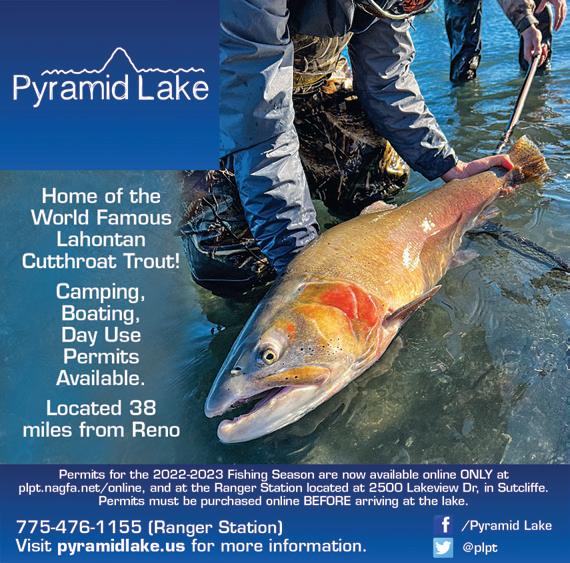
With the UL rod, I threw a small 3-inch swimbait and a variety of other small plastic baits on a 1/8-ounce darter head jig. I tied up a drop shot on the L and a finesse football-head jig with a twin-tail grub on the ML. While I fished all three rods extensively, on this day the bass showed a definite preference for a 3-inch Yamamoto Shad Shape Worm rigged on the drop shot.

Overall, I was very impressed by the light weight and balance of each rod. The New Guide Concept System and the minimalistic split-grip handle were perfectly executed. The rod actions were precise and the blanks were supersensitive and splined perfectly. Aesthetically, the builds were as nice as any custom rod I own. Simply put, these Prolites fish as good as they look.
I am looking forward to putting in some serious work with these rods this spring. On a side note, I am looking for a new trout rod and I have a notion that Chris builds these too. After all, you can never own enough fishing rods. CS
Editor’s note: For more information on Prolite Rods, check out their website at proliterods.com and follow on facebook.com/ proliterods and Instagram (@proliterods).



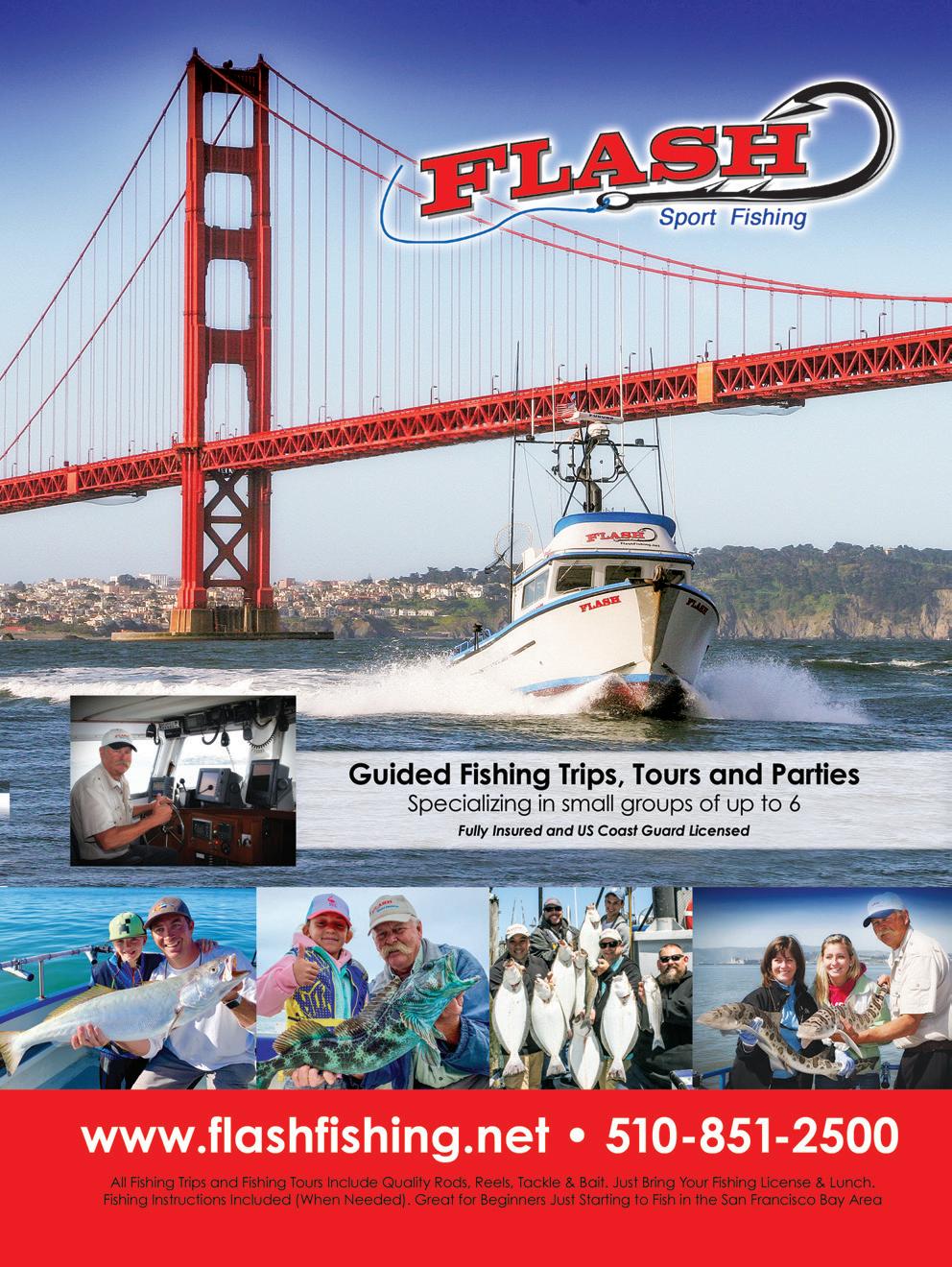
White sea bass can be frustrating fish to catch.
When you are actually targeting them, it seems like they either are on some suicide mission to get in the boat, or you locate them and nothing works to get them to bite.
For a lot of Southern California anglers, if they’ve caught one at all, it was simply a lucky occurrence while

targeting other fish. That was the case for me and my first white sea bass.
I was fishing on the New Del Mar out of Marina del Rey Sportfishing (mdrsf. com). It was a sunny June day and the barracuda had just moved into Santa Monica Bay. I was trying to throw a surface iron to catch the ’cuda, while a majority of the other passengers were flylining a live sardine for them. When every cast resulted in me raking in several lines, I gave up and sunk a
leadhead with squid to the bottom hoping for a sand bass. I got really lucky and got bit by a bass of a different kind. After that first fish, I tried seven times to catch one intentionally. I learned a lot of painful lessons along the way. Hopefully you can avoid those mistakes and take home a trophy white sea bass the following advice.
THE BASICS
This article is intended to help you
catch white sea bass in Southern California – not the Bay Area, nor Baja California. White sea bass can be found in those zones too, but the bait and techniques are different. That’s not to say what I share here won’t work there too, but always heed the advice of the locals.
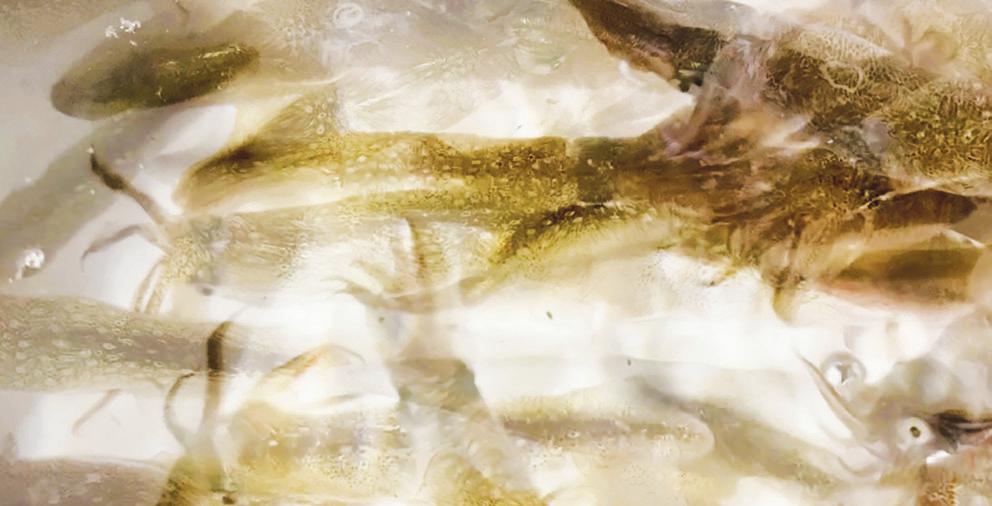
Sea bass are always around. There’s always the chance you could get lucky catching one while targeting another species. When that happens, it’s typically along the kelp line fishing for calico bass. They move around a lot, though. The best opportunities to target them are during a bait aggregation of some sort. In Southern California, that typically means squid.
The hooks used for any given fishing application are determined by the size and type of bait you are using. Since we are talking about squid, a longer-shanked J-style hook is the right choice. You want a gauge that is strong enough to withstand the fight of a white sea bass (or yellowtail or halibut). The Owner Aki Twist in a 5/0 size is what a lot of people use. The size matches up with the size of squid we typically have here. There
is a straight version too, but the Twist has an offset that is believed to increase your hookup ratio.
Spring and summer months are the prime time for fishing white sea bass. The limit from March 15 to June 15 is one fish. The minimum size to take is 28 inches.
It’s a good idea to plan ahead and book a trip or two now. Moonphase is a factor when picking your dates. The preferred times are within three days before or after a new or full moon.
The Channel Islands consistently produce the most fish year after year. If you are looking to book ahead, two of the most popular captains/boats are Capt. Shawn Steward of the Graylight (six-pack charters only) and the Aloha Spirit out of Channel Islands Sportfishing (channelislandssportfishing.com); and Capt. Tucker McCombs of the Endeavor out of Ventura Harbor Sportfishing (venturasportfishing.com).
The only difference between a sportboat versus private-boat application


of these setups is that in a privateboat scenario, you often anchor up and fish all three at the same time. In this way you can cover different parts of the water column at once. I’ll talk about these rigs from a sportfishing boat perspective.
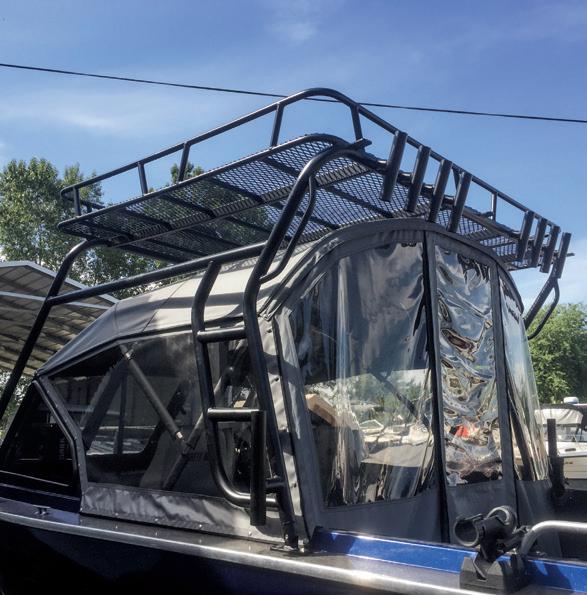
This is the most common rig used. Don’t let the name confuse you, though. It’s very different from the dropper loop you may know from rockfishing. First of all, the loop itself is done using a surgeon loop knot. (Note: A lot of videos show passing the loop through the knot twice. I’ve been taught on the boats to pass the loop through three times.) Also different from a rockfish rig, you tie on the hook using a palomar knot. The loop should be 3 to 4 feet above the weight (usually 8 to 12 ounces based on depth and current).
I highly recommend using a stardrag reel when fishing white sea bass. Most fish are lost during the initial run after getting bit. The proper drag to set on the reel is probably a lot less than you would assume. The reason is
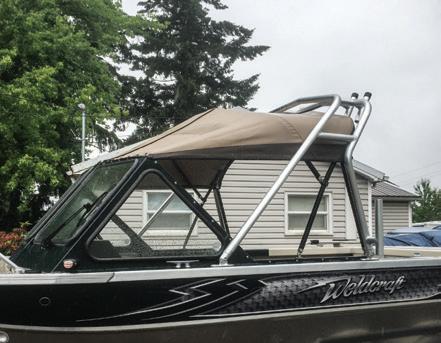



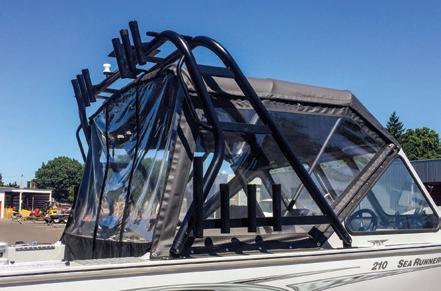


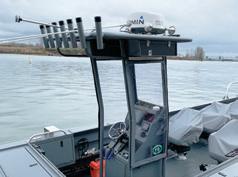


that you really want them to swallow the bait and run. Don’t set the hook! Let the rod load up, gently bring the tip up to a 45-degree angle, and let the fish run. When the fish tires out, it’s OK to click up the drag a bit.

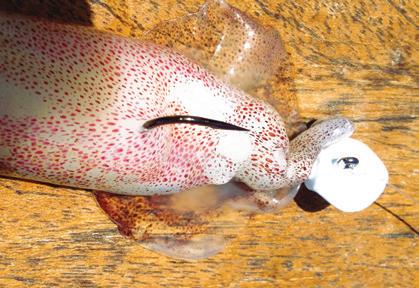

The setup I use is a Fishing Syndicate FSC-800M (20-50) casting rod paired with a Shimano Trinidad 16A levelwind reel with 30-pound mono. I use 20- to 30-pound fluorocarbon to tie the actual loop. Go heavier to start, and drop down
from there if you aren’t getting bit.
If the fish aren’t directly under the boat, then this is the rig you want to use to reach out and find them. The setup is pretty simple: Tie on a light leadhead or use a sliding sinker in front of a hook. The weight of the sinker or leadhead used will vary depending on depth and current. The idea is to target higher in the water column than the lower part you’re
Author Joe Sarmiento (left) and his son took this nice sea bass on the Marina Del Rey-based New Del Mar. “There’s always the chance you could get lucky catching one while targeting another species,” he writes. “When that happens, it’s typically along the kelp line fishing for calico bass.” (JOE SARMIENTO)
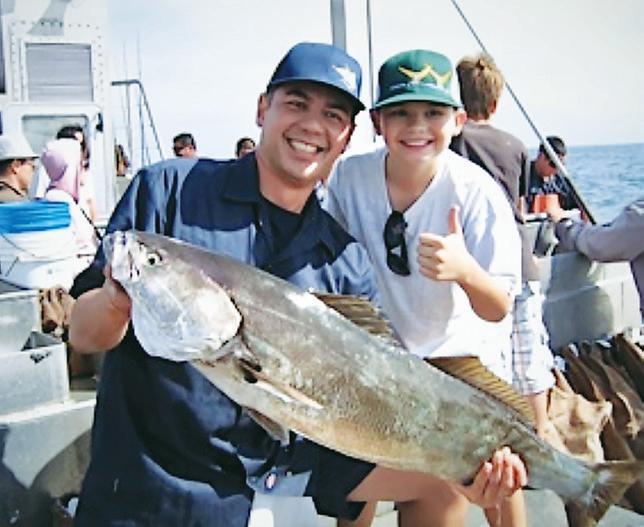
working with the dropper loop.
I like to use the Fishing Syndicate FSC 900L (15-30) rod paired with a Penn Fathom 400 baitcaster for this application. For line weight, I typically use the same as I would on the dropper. If you are fishing near the kelp, though, go heavier! I landed my personal-best 62-pound fish at Catalina Island using 80-pound braid to 50-pound fluorocarbon.
In a private-boat scenario, you’d want to deploy this rig in the middle of the water column (so, your dropper setup 3 to 4 feet above bottom, light leadhead/slider on top and this one midwater). If fishing a sportfishing boat, you might want to try this rig as a changeup to the dropper. In the past, a glow and white iron jig with a big single hook tipped with one or two whole squid was the way to go.
Lately, I’ve been doing it with a flat-fall-style jig to get more flutter. Drop it to the bottom, crank it up five to 10 cranks and just leave it alone. I use this one most often just before dawn when there aren’t a lot of people on deck. I’ll put it in a rod holder and just keep an eye on it as I have some coffee.
Although each of these rigs and methods are time-tested, always lean on the captain and crew for the most up-to-date info. They want you to be successful, have a good time, and tell your friends. Good luck! CS

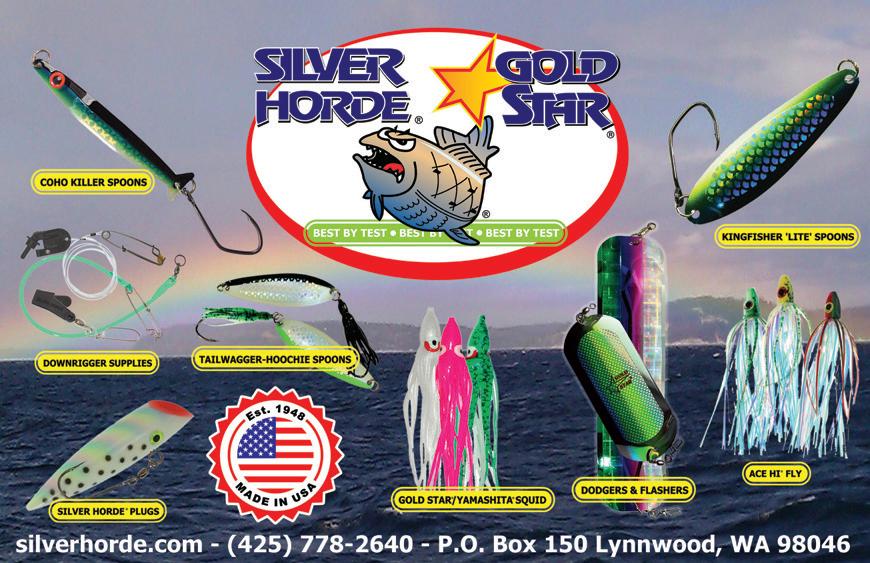

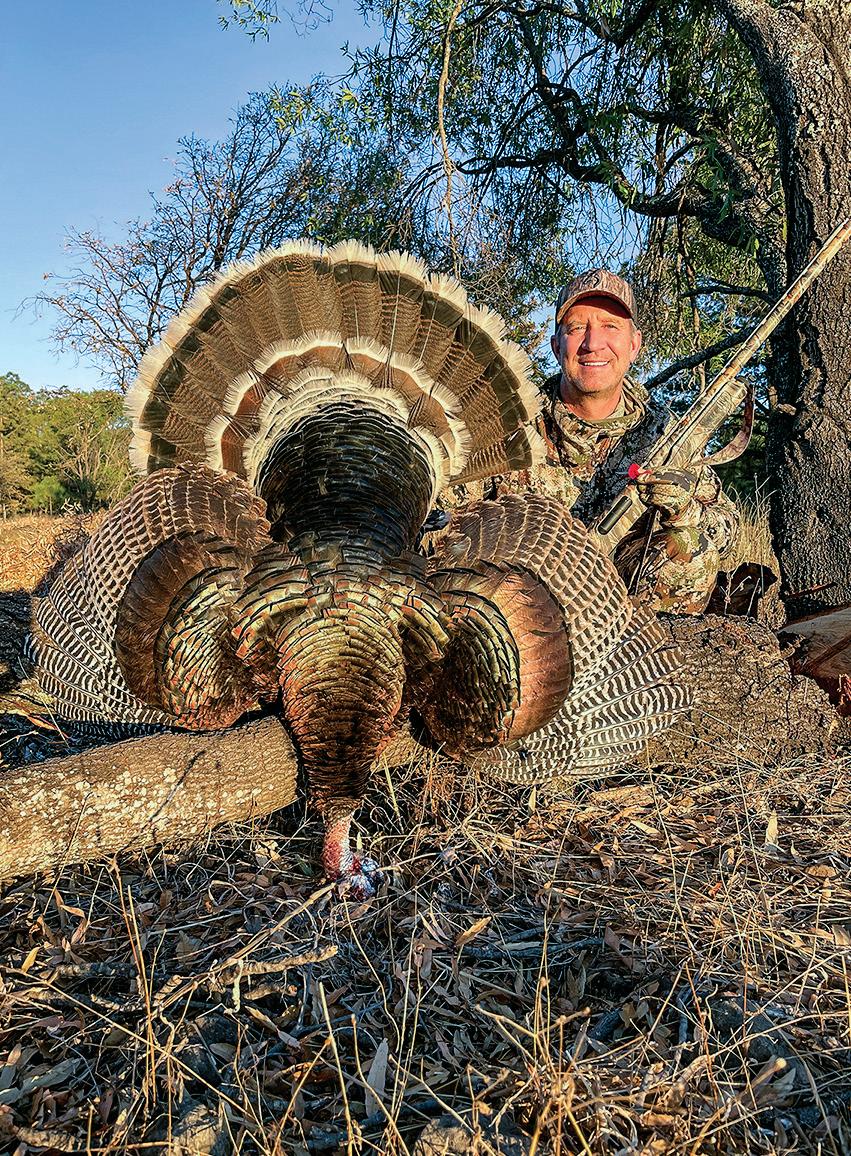 By Scott Haugen
By Scott Haugen
With California’s general turkey season over for most of us, don’t despair, as there’s another option not far from home. And I’m not talking about one of the bordering states. Rather, it’s a trip south into Sonora, Mexico; the prize: a Gould’s turkey.
That’s where two buddies and I headed last year at this time – midMay, to be exact. Good friends Parrey Cremeans and Ted Lidie, both of Redding, invited me on this trip. Cremeans and I have hunted a lot together over the years, and he knew the last turkey I needed to complete my world slam was a Gould’s subspecies.
But what I was attempting to accomplish paled in comparison to my comrades. Cremeans was trying to complete his world slam – harvesting six subspecies of wild turkey, including eastern, Rio Grande, Florida Osceola, Merriam’s, Gould’s and ocellated turkey – in a single season, and this was the last turkey he needed. But Lidie one-upped both of us. For Ted, he needed two Gould’s to complete a single-season double grand slam. That’s right, two turkeys of each subspecies – all six of them –taken in a single season.
Going into our hunt, both Cremeans and Lidie had their singleseason eastern, Rio, Merriam’s and Osceola turkeys. Osceolas are only found in Florida. They also had their ocellated birds from the jungles of Mexico, what many turkey hunters hail as the pinnacle of the world’s turkeys. All we needed were Gould’s.
When
Trout season is here and as summer beckons, you can enjoy all kinds of catches! If you’re looking for a fun, tasty recipe, this is it. It even works great with salmon, steelhead or even bottomfish you might have stored in the freezer.
Coated and fried fish with a tasty sauce is great, but try adding more flavor under the coating to enhance it even more. The hummus and pesto layer in this recipe also locks in moisture, which helps when frying fish like halibut that can easily dry out.

This recipe can be altered in many ways, depending on the flavor of the pesto, hummus or even the type of potato chips used. The first time I tried this recipe was with halibut that had been frozen, and everyone
loved it. Next, I cooked fresh-caught lingcod with it, which was a huge hit, as expected. People commented on the great flavor that was maintained without compromising the
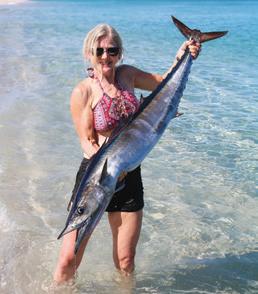
taste and texture of the ling.
Then came the time to prepare salmon with it, and again, it was a big hit with everyone who tried it. It’s one of those quick and simple recipes you’ll find yourself going back to.
1 pound trout, salmon, steelhead or bottomfish, skin removed
¼ cup rice or wheat flour
One egg
¼ cup pesto
¼ cup hummus
½ cup breadcrumbs
1 cup crushed potato chips
Oil for pan-frying (optional)
Cut fish to desired serving sizes and remove any bones. Cutting it into fish sticks makes it easy to remove the bones, and then folks can eat it as finger food, if desired. Dust fish pieces with a thin layer of flour. In a shallow dish, whisk egg, pesto and hummus. Mix breadcrumbs and crushed potato chips together and place on a plate. After coating with flour, dip each piece of fish in the egg mixture and press into crumb/chip mixture.
Bake in a preheated 375-degree oven for 12 to 15 minutes or pan fry in one-third of an inch of coconut, olive or canola oil on medium-high heat for three to four minutes per side, or until golden brown. Serve with green sauce (see below) or a favorite tartar-style sauce.
GREEN SAUCE
½ cup hummus
¼ cup pesto
2 tablespoons olive oil
1 tablespoon lemon juice
Salt to taste
In a small bowl, whisk until thoroughly combined. Add water if needed to reach desired consistency.
Editor’s note: For signed copies of Tiffany’s popular book Cooking Seafood and other best-selling titles, tiffanyhaugen.com.

you think fish sticks, don’t assume they all come out of your grocery store’s freezer like those you enjoyed as a kid. Tiffany Haugen, who caught her wahoo (below) in Mexico, serves up a kicked-up version of a childhood classic. (TIFFANY HAUGEN)

WE FLEW INTO HERMOSILLO, Mexico, a place I’d been to a few times to hunt mule deer and Coues deer. There we were met by a member of Wingshooters Lodge (wingshooterslodgecom), which is owned and operated by famed hunting guide Miguel Puig (mpuig@ wingshooterslodge.com), who has been guiding in Mexico for decades. I was honored to finally be in his hunting camp.


After a five-hour drive into the Sierra Madres, there was no time to rest. “Get dressed and be ready to go in 15 minutes,” Puig smiled as he handed me an ice water. “There’s been a big tom working a section of timber up high, and he’s most active in the evening. I want you to try for that bird tonight.”
Soon I was dressed and headed out with Jorge, one of Puig’s guides. Traveling on remote logging roads, it took nearly an hour to reach the

hunting spot, located at over 7,500 feet in elevation. We set out a decoy and called, but heard nothing.
Jorge pulled a box call from his pack and let it rip. A loud cutting series elicited the gobble we’d hoped for. The tom was on the same ridge we were, but so far away I seriously doubted it could reach us by dark,
even if it started running just then.
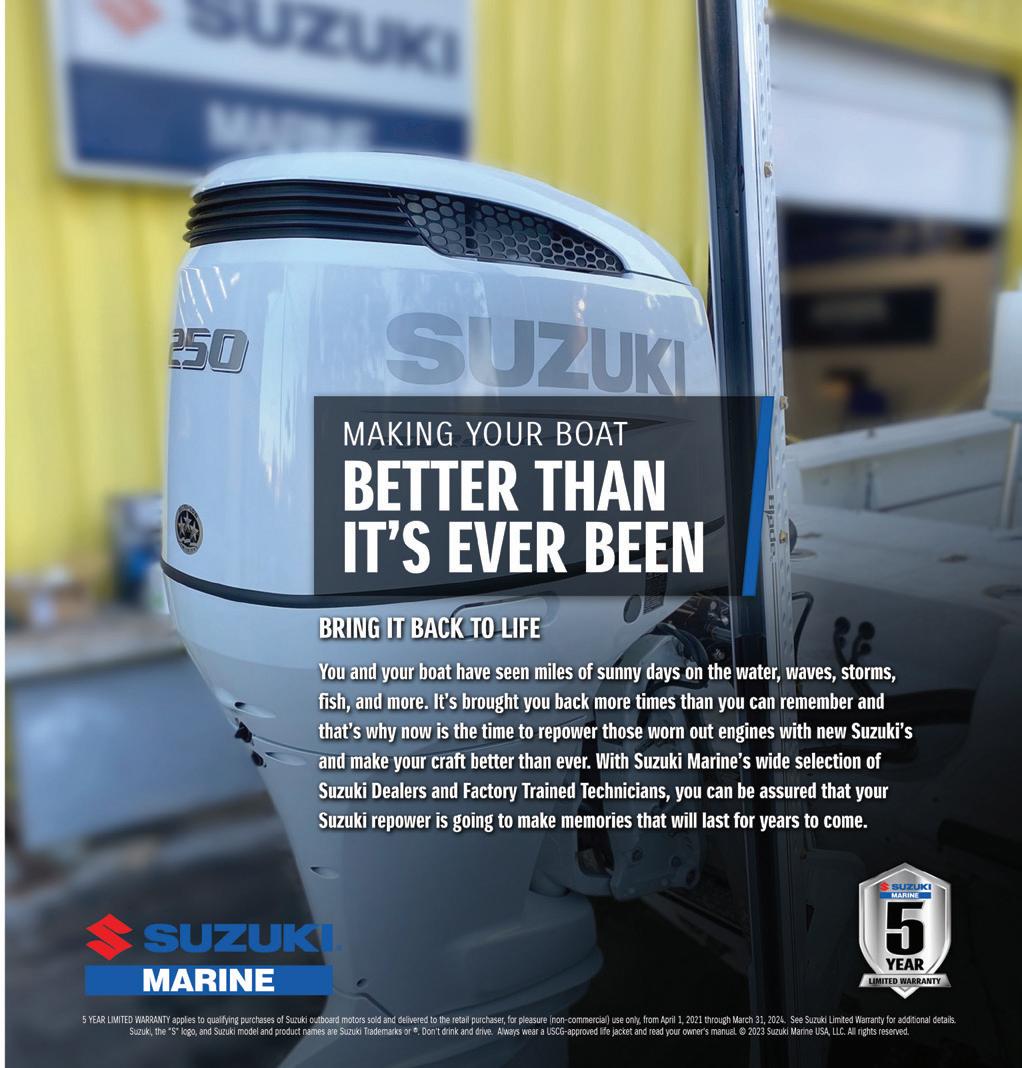
I took over the calling with a Slayer diaphragm call. I’d used this call to bring in several Rios earlier in the season, and wanted to see how it performed on the Gould’s. I like doing my own calling, and Jorge understood.
After 15 minutes of calling, the tom finally gobbled. It was closer, but still
so far I had my doubts. I kept calling. We didn’t move. Thirty minutes later it gobbled again, this time within a couple hundred yards. For the first time I thought it might happen.
Minutes before the sun dipped below the mountaintops, the lone tom came silently strutting into the decoy. I’ve called in hundreds of big toms over my more than 35 years of turkey hunting, but this was the most stunning strutter I’d ever witnessed. The shot was simple and just like that, two hours into the hunt my world slam was complete.
THE NEXT MORNING, LIDIE went one way and I followed Cremeans in another direction. We met up at lunch and Lidie had a big tom that came to a decoy. It was high on a mountain and several toms came strutting through the ponderosa pines, right into Lidie’s lap. Now, he was only one bird away from his double world slam.
That afternoon Cremeans filled his first tag on a sparsely wooded hillside. It was a brilliantly colored tom, one you envision when thinking of Gould’s turkeys.
The next day I went looking for turkeys to photograph, but I had no luck. When I got back to camp for lunch, Cremeans and Lidie were all smiles. Not only had Cremeans taken a second tom, but Lidie had completed his single-season double slam.
Cremeans took his tom as it strutted around some hens – just outside the decoy – amid a beautiful forest of ponderosa pines. Lidie got his in a creek bottom, another beautiful habitat in which these turkeys live.
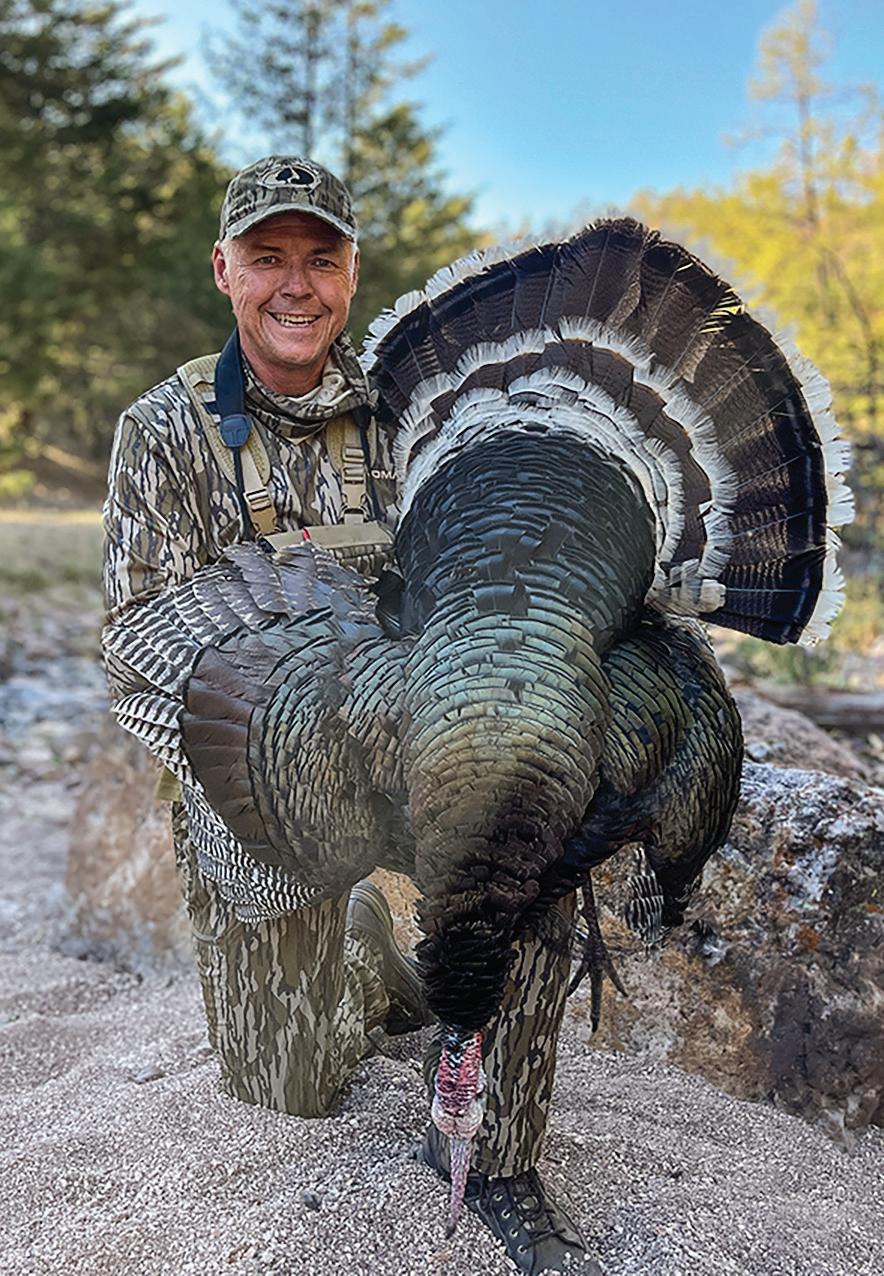
For each of us, it was a hunt we’ll never forget. Great people, excellent food, a comfortable camp, and a turkey so striking in contrasting blackand white-fringed feathers, just seeing one takes your breath away. CS
Editor’s note: For signed copies of Scott Haugen’s popular book, Turkey Hunting The West: Strategies For All Levels, visit scotthaugen.com. Follow Scott on Instagram and Facebook.


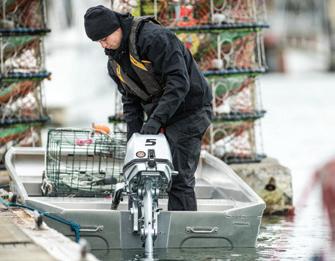
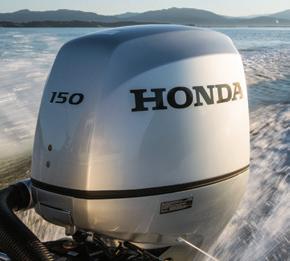
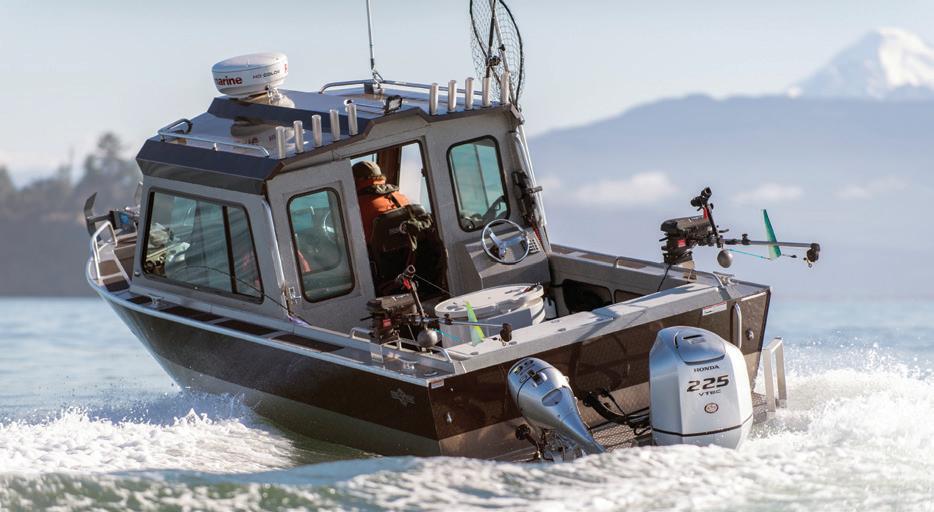
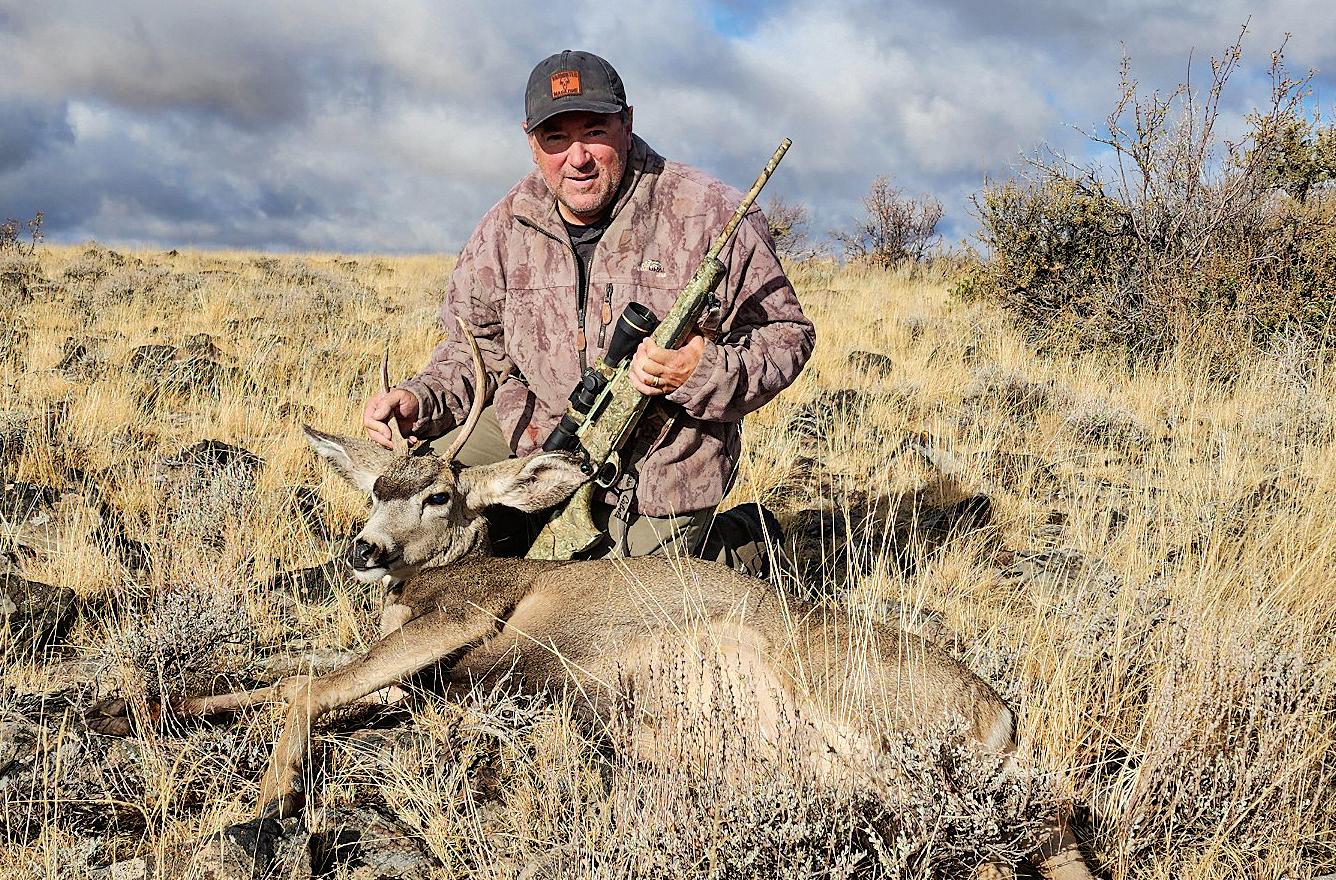 By Tim E. Hovey
By Tim E. Hovey
For most of my life, I’ve been a California sportsman. Born and raised in the Golden State, I caught my first fish at the age of 5. After relocating to Central California at 12 years old, my father chose to support my outdoor interest and presented me with a Crossman BB gun during our first Christmas there.
From then on, I fished and pursued small game as much as time and responsibilities allowed. From a very early age, I knew I belonged outside.
I was obsessed with fishing for the first part of my adult life. So much so, I pursued a degree in fisheries, which eventually led me to a career as a fisheries biologist for the state’s Department of Fish and Wildlife. While I dabbled in hunting, it didn’t
become an obsession until my late 20s. As if my interests simply flipped a switch, I thirsted for the challenges of everything hunting and shelved my fishing interest for a few years.
I feel fortunate enough to have experienced the California outdoors during a time when management was guided by science and seasons and limits were established by the animal, based on information gathered by
trained biologists. Unfortunately, over the last 15 years or so, that no longer seems like the case in California.
Tired of the direction of the Golden State and wanting to give my daughters a fighting chance at life, I decided to relocate the entire family in August of 2020. I’d retired a year early and we had a house built in southern Idaho. We were presented the keys to our new home on my birthday. It was the best birthday present ever.
I DIDN’T WAIT LONG to get out and explore what Idaho had to offer the outdoorsman. This will be our third year in the Gem State, and I’ve
absolutely enjoyed everything about Idaho. From big game to small, from predators to upland birds, I have chased just about every species available to an Idaho resident in the short time I’ve been here. I have fished the amazing Snake River for smallmouth bass and have sampled a handful of wild trout streams. To say I’m in outdoor heaven would be an understatement.
It’s only natural for me to compare outdoor opportunities between where I came from and where I am now. Idaho and California have many of the same huntable species, but things in Idaho are managed differently. I know I haven’t been here long, but
here is what I’ve noticed so far.
• Beginning with the basics, over 62 percent of Idaho is public land, compared to California’s 52 percent. As of 2021, Idaho had a statewide population of approximately 1.9 million people. California’s statewide population is around 40 million and growing.
• During the 2021 season, 16 percent of Idaho residents purchased hunting licenses – or combo hunting and fishing licenses – an increase from the previous year. During that same period, only 0.6 percent of Californians purchased a license, a slight decrease from the previous year.
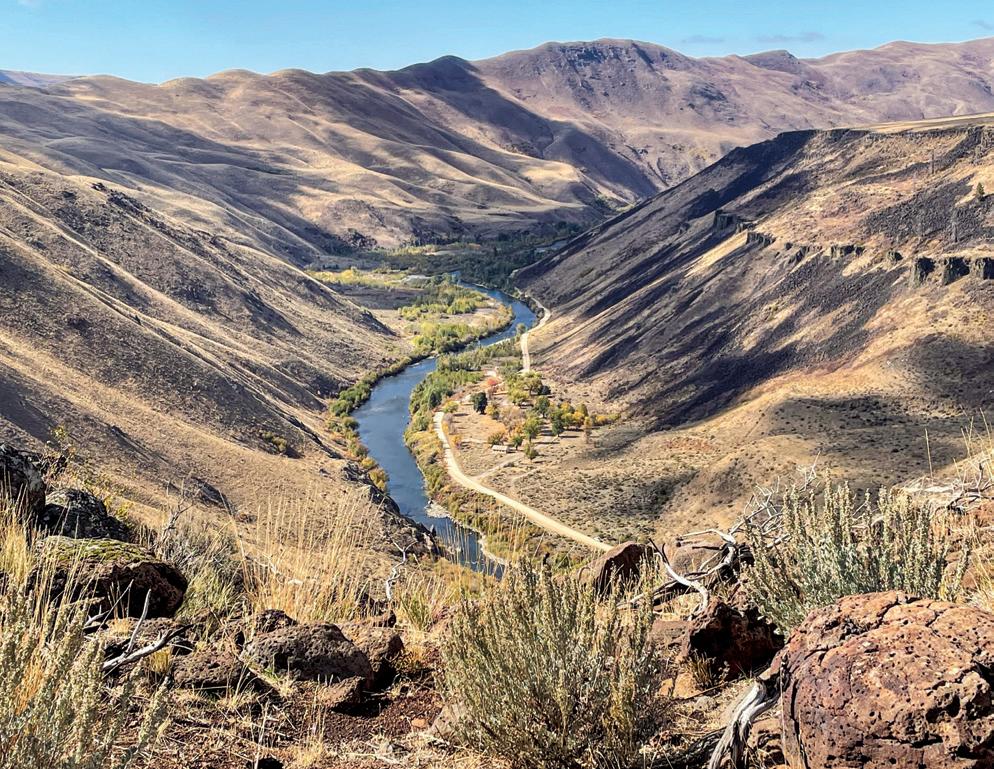


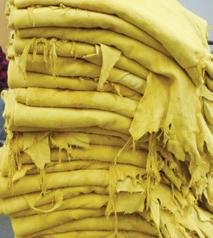

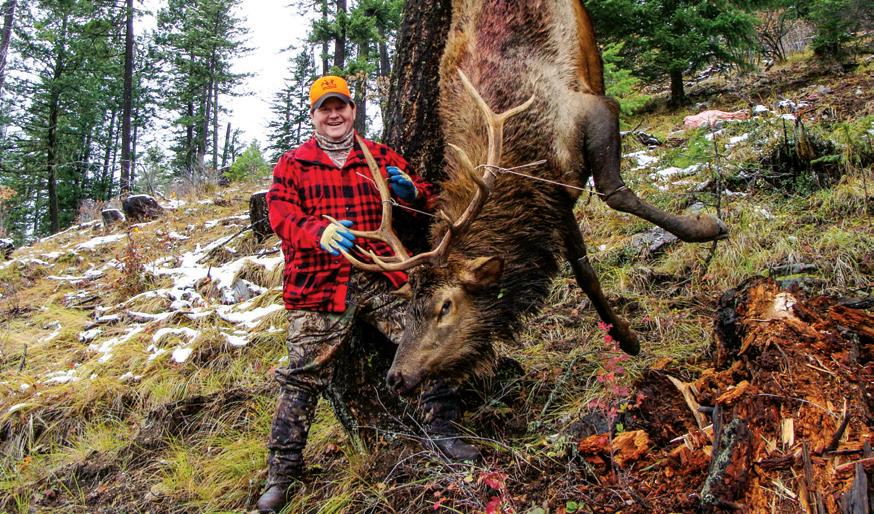

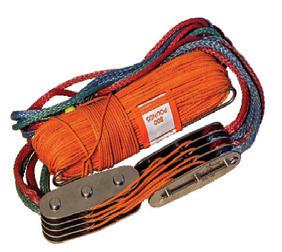
• The week after we arrived, I stopped by the local Idaho Fish and Game and picked up a nonresident license for $165. Without me even asking, the clerk looked me dead in the eye and told me to return in exactly six months when I would become a resident. “Bring back your license and we’ll take care of you!” I really didn’t know what she meant, but I made a mental note to return.
• While I was at the office, I checked out the resident license prices. At that time, an Idaho hunting license cost $14 and a fishing license was $30.50. Idaho Fish and Game also offers a combo hunting and fishing license (now $38.75), giving sportsmen and -women a price break if they purchase both. In comparison, California offers hunting and fishing licenses for $58.58 each. As many Californians know, these prices seem to steadily increase every year. As far as a combo license, the Golden State is still working on it.
• Idaho’s hunting and fishing licenses are both good from January 1 until the end of the year. While California fishing licenses are now good for 365 days after purchase, their hunting license still runs from July 1 until June 30.



WITH MY HUNTING LICENSE in hand, I started exploring my new state. One of the first things I noticed was that
it didn’t take long for me to get into huntable land. Within 20 minutes of my new house, I was driving through huge swaths of Bureau of Land Management land and open Idaho state land. As a former Southern California resident, I remember having to drive at least two hours to get to my hunting grounds.
On that first drive, I bumped a pretty big covey of Hungarian partridge, or Huns, right off the road. These birds are about as big as chukar and not available to the California hunter. With the Idaho Hun season still a month away, I dropped a pin on my onX maps app and continued on.
The area we settled is known as the Treasure Valley and is surrounded by several mountain ranges. During the winter, these ranges will stay snow-covered and are home to elk, mule deer, cougar, bobcat, bear and wolf, all of which are huntable here in Idaho. The predators on this list are definitely managed differently between the two states.
Since 1990, California has started a very dangerous trend of sidestepping the state’s Fish and Game Commission, drafting species-specific bills that remove animals from the list of huntable species. Having read several of these high-profile species’ bills that were pushed through the California legislature, I can say that the science is either wrong, lacking
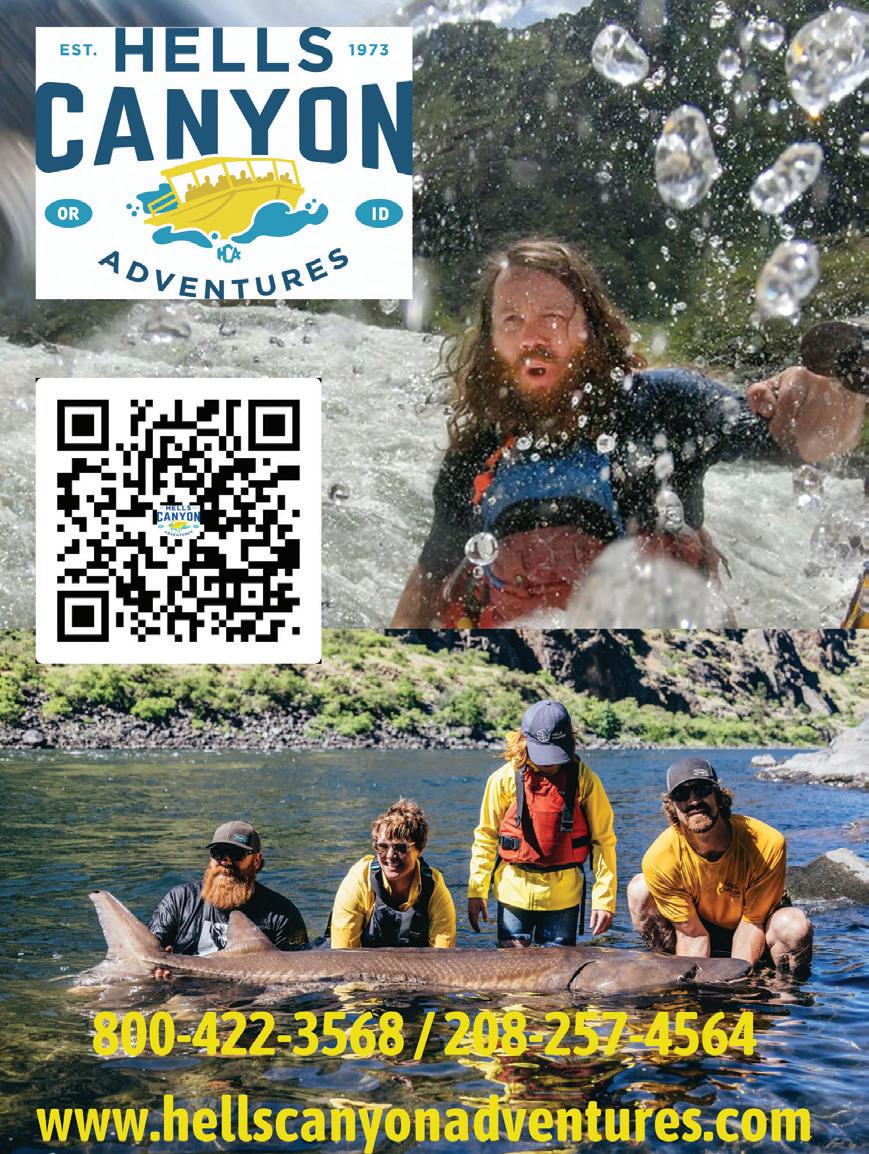
or often completely absent in these documents. The commission is tasked with managing the game species of California using science. Removing this entity from the decision-making process is bad for California hunters and terrible for the species.
Idaho uses their Fish and Game Commission to drive management that is reliant on science gathered by trained biologists. Following the North American Model of Wildlife Conservation, the Idaho commission relies on hunters to gather some of
the data through tag purchases and harvest data to drive conservation, as it should be.
I experienced a great example of this method of management in Idaho the first year I was here. I purchased a sage grouse tag at the local Idaho Fish and Game office. At that time, only one tag per hunter was allowed and the season was a short seven days long. Through additional biological data gathered that year and harvest information provided by hunters, the next season was increased to six weeks and hunters were allowed two tags. Proper management driven by the resource allowed adjustments to the season, to the benefit of the overall sage grouse population and the state’s hunters.
With the exception of waterfowl, of course, Idaho allows lead ammunition for all other hunting. In California, Assembly Bill 711 was signed into law in 2013 and gradually phased out lead ammo for all species by 2019. California hunters need to plan accordingly and search for non-lead alternatives to hunt any game.
Other hunting technologies like airgun hunting and thermal night hunting are approved methods of take here in Idaho for select species. That includes using an airgun for waterfowl with nontoxic shot no larger than .20 inch in diameter (airguns are federally banned at certain national wildlife refuges). Idaho Fish and Game is forward-thinking and adaptive when it comes to hunting.
“This will be our third year in the Gem State, and I’ve absolutely enjoyed everything about Idaho,” writes Hovey, here with a 2021 turkey.

“From big game to small, from predators to upland birds, I have chased just about every species available to an Idaho resident in the short time I’ve been here.” (TIM E. HOVEY)
BEFORE MOVING TO IDAHO, I began investigating what kind of trapping opportunities were available there. When I was younger, I trapped in California and helped neighbors with nuisance animals. As an adult, I started looking into getting a trapping permit and setting up a small trap line. Honestly, the regulations were so confusing and tight that I decided to abandon the endeavor. As if to stomp that interest out altogether, California banned the trapping practice completely in 2019.
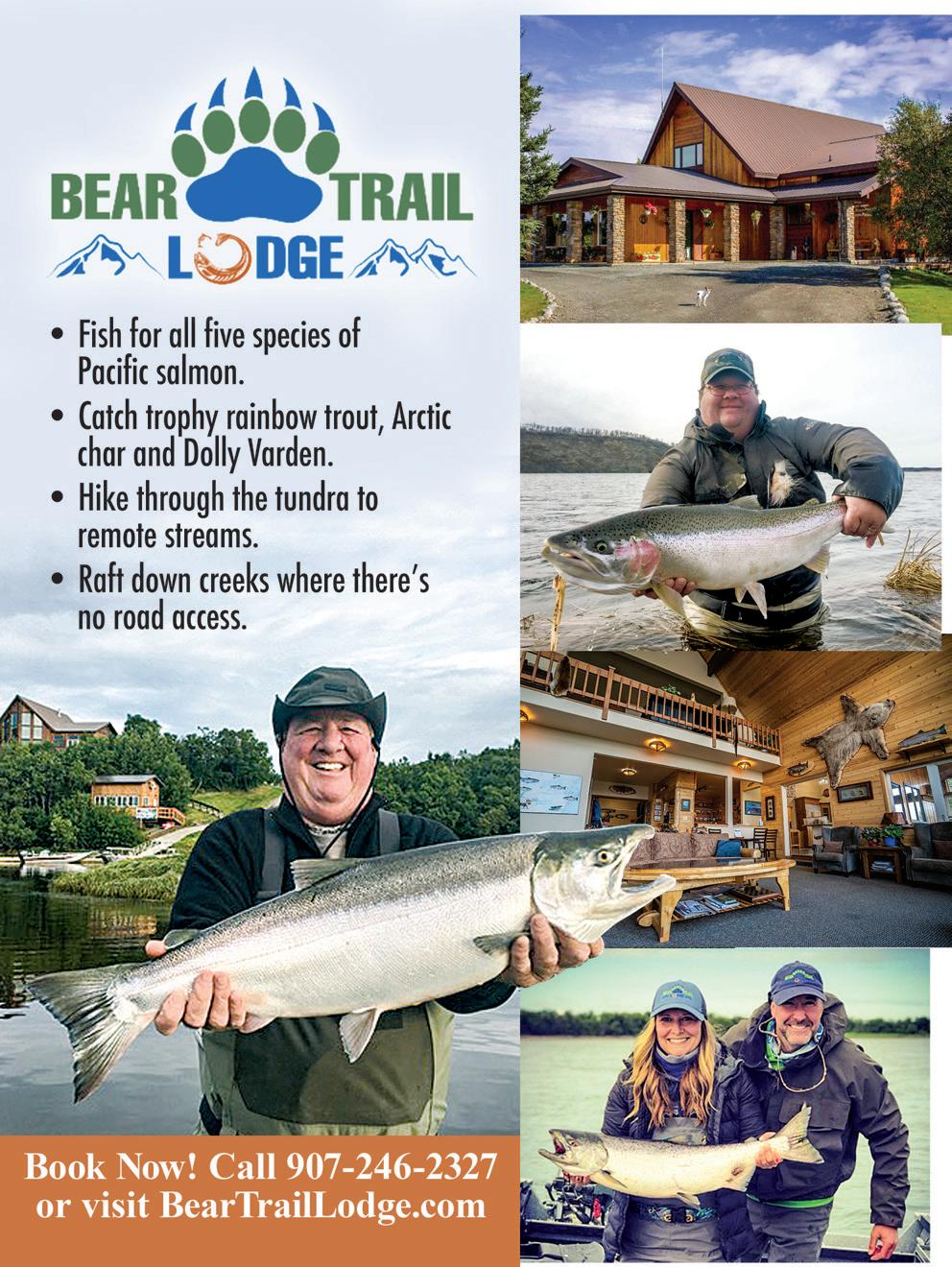

Idaho requires you attend a trapping class over a single day and then you are allowed to purchase a trapping license. Three weeks after I arrived, I enrolled in the basic trapping class and the wolf trapping class over the same weekend. Using what I already knew and learning as I went, I now trap three separate properties for nuisance species here in Idaho to assist with waterfowl and upland game bird restoration. And they pay me to do it!
Six months after I purchased my first nonresident hunting license, I went back to the Idaho Fish and Game office and walked right up to the counter. I knew I was now a resident of Idaho, but I had no idea what could be done about my nonresident license.
The same staffer who sold me the license was again waiting on me. The crazy thing was that she actually remembered me. She informed
me that they could not issue me a refund, but she could transfer the cost of the nonresident license over to a resident sportsman’s license for free. The sportsman’s package included a combination Idaho resident hunting and fishing license, as well as tags for deer, elk, cougar, bear, wolf, turkey, salmon and steelhead. Think what you want, but that license transfer would not have happened in California.
WHILE MY WIFE AND I have missed the California shore fishing scene, we have found ample fishing opportunities here in Idaho. There are over 20 ponds or small lakes within 30 minutes of our house that are stocked weekly during the season. The Snake River has treated us to some amazing bass fishing, and it seems like the smarter sportsmen here keep a rod and tackle in their truck just in case. In short, fishing is as big, if not bigger, than
hunting in Idaho.
Finally, I’ll end on this: My family all experienced an amazing amount of friendliness and hospitality here in Idaho the day we moved in. While we offloaded the moving van, an older gentleman using a walker shuffled up my new driveway. As I approached, he simply stated, “Pizza and soft drinks are on the way … Welcome to Idaho!” I will never forget that!
That sentiment has never faded here. People are friendly and happy to see you. They ask you how your day is going and are genuine. In California, if I saw another hunter in the field, I steered clear. Here in Idaho, I happily walk up and talk with them, and most give me advice on hunting Idaho or are just happy to sit for a bit and gab about life. Honestly, this took me a while to get used to.
Now, when people ask me where I’m from, I tell them with a hearty smile, “Idaho!” CS
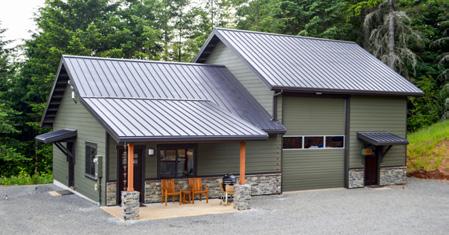


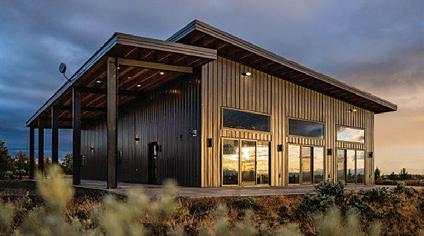





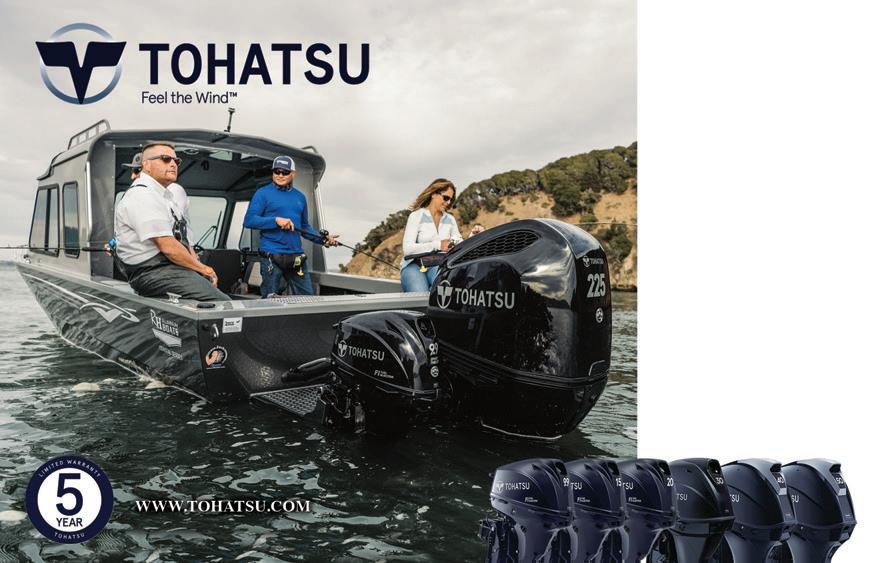


 By Scott Haugen
By Scott Haugen

In early March I took my dogs into the forest of western Oregon, searching for blacktail deer sheds. A recent snowstorm and heavy rains had knocked down all the ferns along the ridge we worked, likely covering any antlers that may have dropped. There were also lots of downed trees and branches that blocked and altered game trails. There were few deer tracks on the trails, too, which wasn’t normal compared to past years.
We then headed to a south-facing slope and hunted for sheds in a small, 4-acre meadow where we’d found them before. There wasn’t a single shed to be found there, either. I think the bad weather was to blame, forcing deer into cover during the time they were dropping their antlers.
Due to the cold weather early in the spring, grass growth is not what it usually is by this time. Shorter grass means a better chance of locating sheds, both by sight and smell. Work your dog in open fields early in the month, because as sunlight hours increase and temperatures rise, the grass in those areas will quickly grow tall and make it tough for a dog to find any sheds.
Likewise, work the forest where ferns and other undergrowth are slow to prosper. Search for game trails that are well used, and know that last year’s trails could have changed due to fallen trees, landslides, flooding and other natural events.
MAKE IT FUN FOR your dog when you’re shed hunting together. If there’s no creek or algae-free ponds where you’re searching for antlers, take water for the dogs. Take frequent breaks, especially if it’s hot and you’re
Even elk sheds can be found and retrieved by your dog. Big antlers dropped in brushy country can be hard to retrieve, so if you lose sight of your dog for a while, make sure it’s not struggling to bring you a large elk shed. (SCOTT HAUGEN)
working steep country. Be sure to check your dog’s feet to make sure there are no split pads or toenails. Also, toss a couple sheds into your backpack without your dog knowing. Handle the sheds with rubber gloves so the scent from your hands doesn’t get on the antlers. If you don’t have any sheds, consider sawing them off the skull plate of deer you’ve shot in recent years. If the antlers are a few years old or have been hanging outside, scuff them up with abrasive paper. This will reveal fresh scent that your dog will pick up on in the woods.
If you’ve not found any sheds and your dog is getting tired or restless, have it sit. Walk out of sight and toss the sheds from your pack to a place where the dog can find them. Go back and get the dog and work into the wind. Set the dog up for success. This is training and it rewards your dog for working hard and doing the right thing. Just make sure and use
the latex gloves, for you want your dog locating the antlers due to their natural scent, not the smell of your hands or even boot tracks.
The same can be done with white, bleached-out antlers. These old sheds won’t contain scent, but dogs will learn to find them by sight. The contrasting colors and shapes of old deer and elk antlers are some things you can teach your dog to look for, recognize and retrieve. This is easier to achieve in open areas than in brushy ones. Again, if you’re not finding sheds, placing bleached ones far away in an opening and guiding your dog to them is a great way to teach and reward them for working hard.
IF SHED HUNTING ON a publicly owned big game wintering ground, make sure it’s open to access. Some states have time restrictions in place for when sheds can be hunted in certain areas. This is to allow the animals
time to begin their spring migration to higher elevations and with the hard winter in some Western states, it could be delayed this spring.
If training a pup to hunt for sheds, don’t let it chew on them. They can mouth it and lick it for a couple minutes, but no longer. You want them wanting more and knowing it’s not OK to find a shed in the woods, lay down and start chewing it. Sheds are not chew toys.
With summer just around the corner, take advantage of the final weeks of spring to get your dog out shed hunting. It’s another great way to spend time in the woods with your favorite hunting companion, and you might be surprised at what they find. CS
Editor’s note: Scott Haugen is a full-time writer. See his puppy training videos and learn more about his many books at scotthaugen.com and follow him on Instagram and Facebook.
